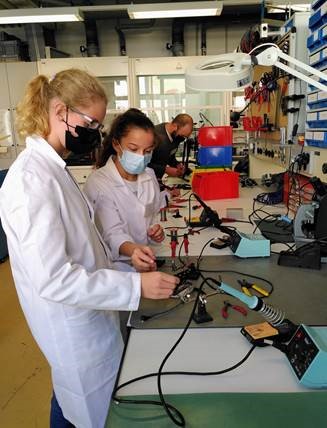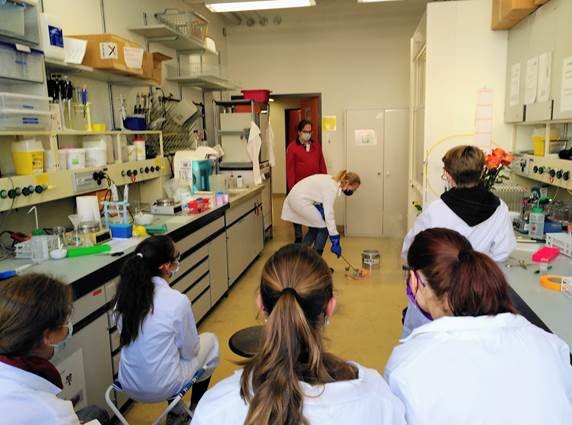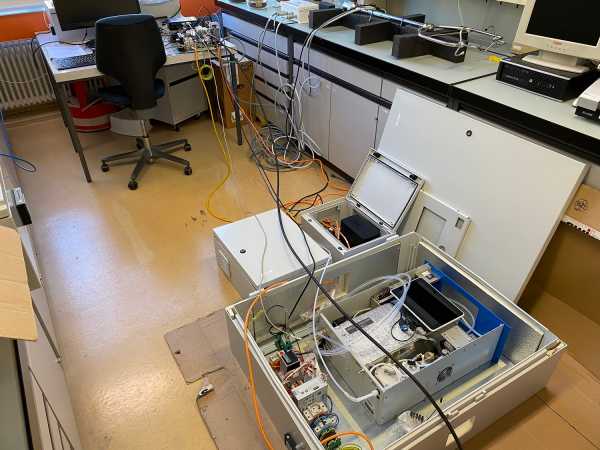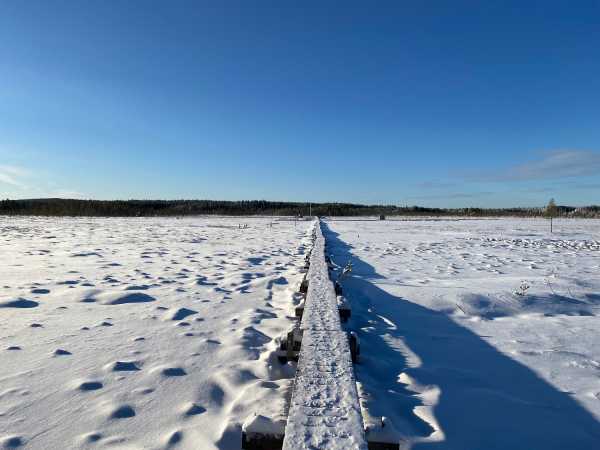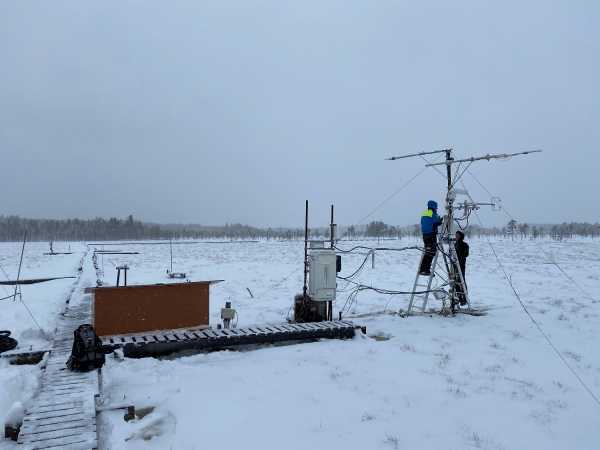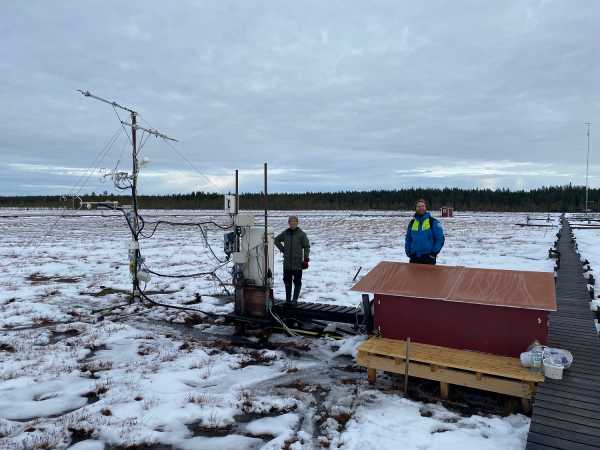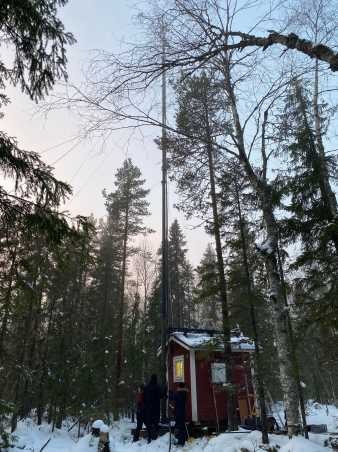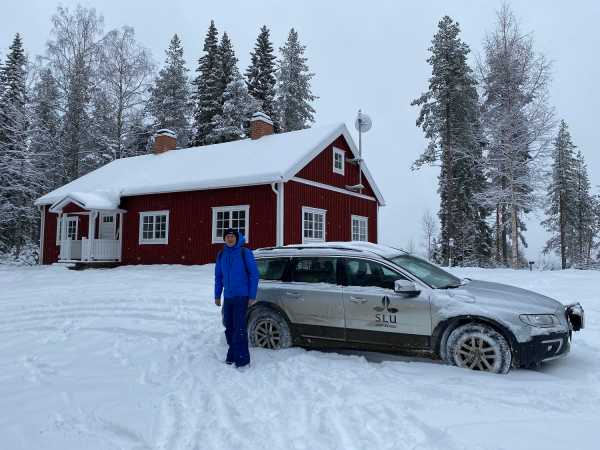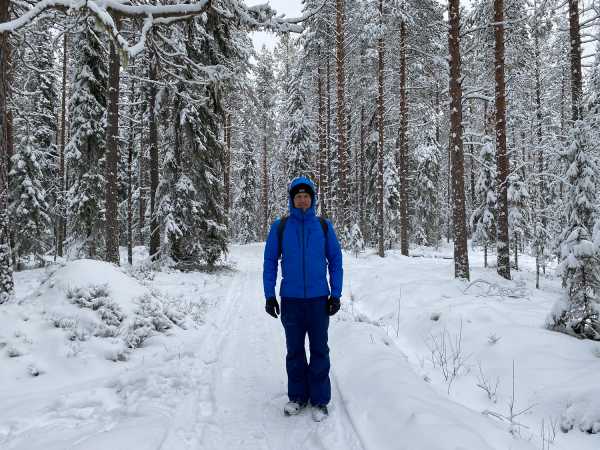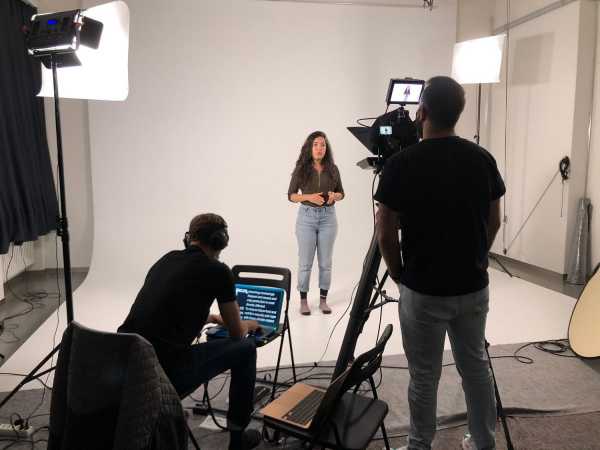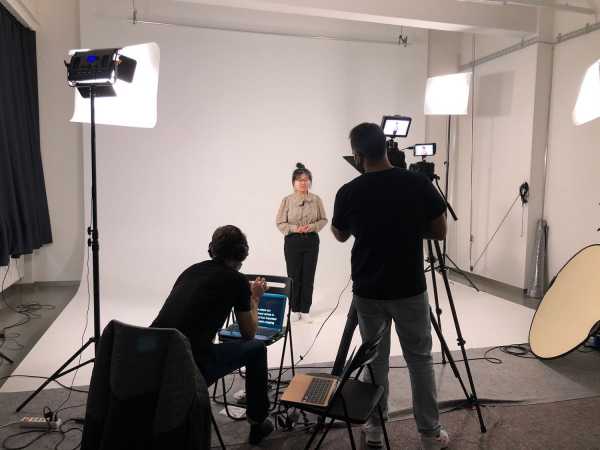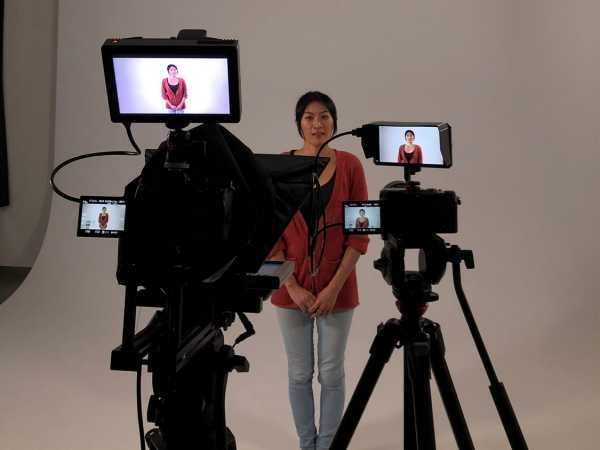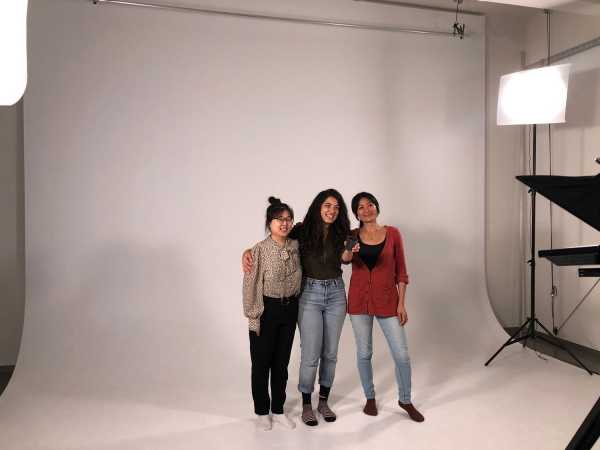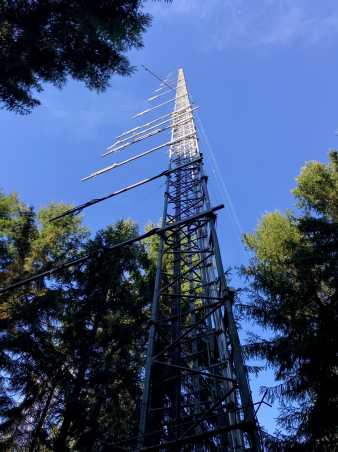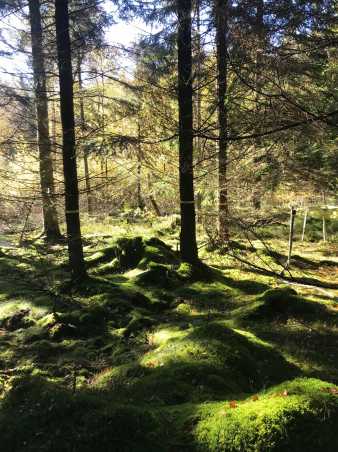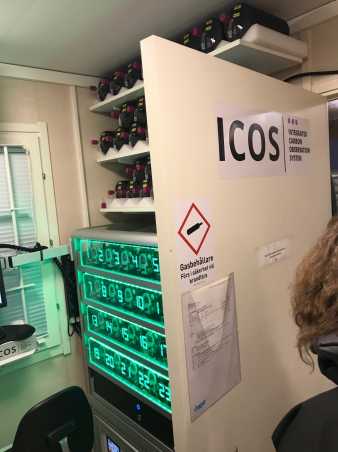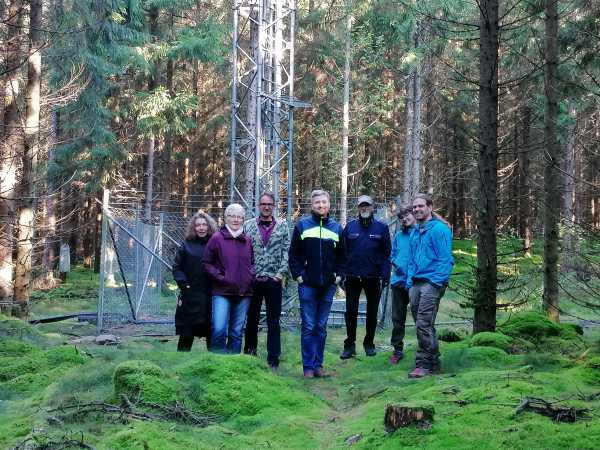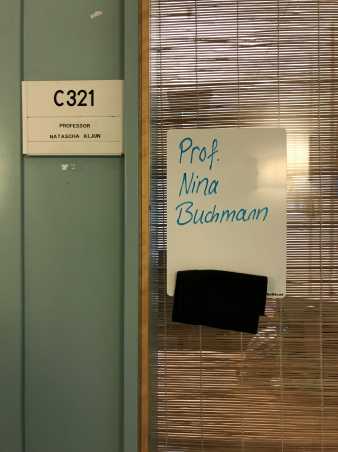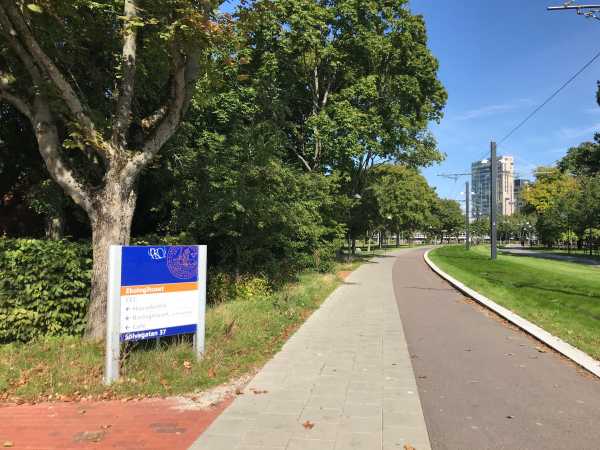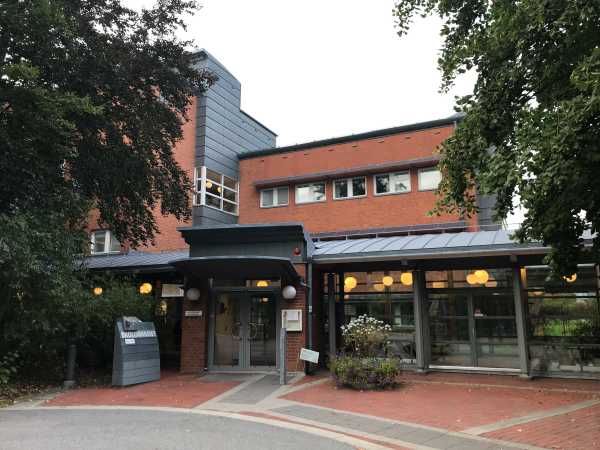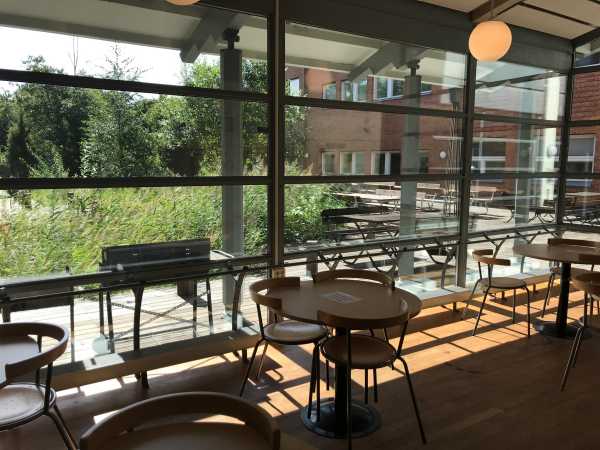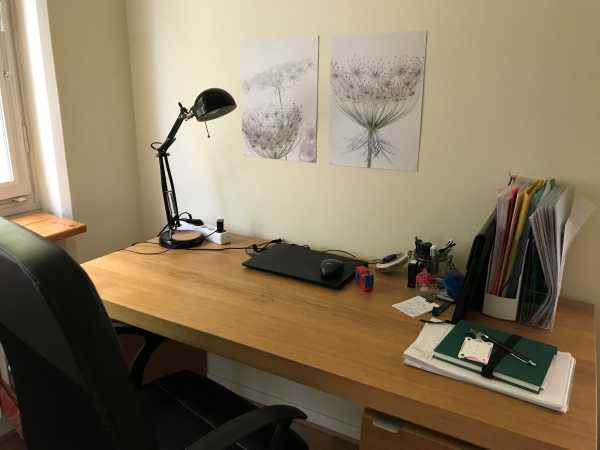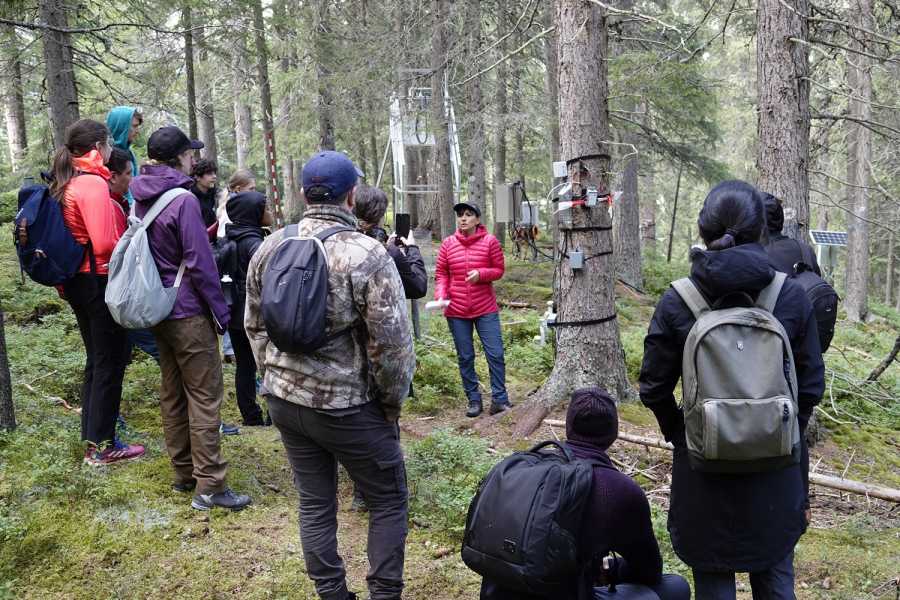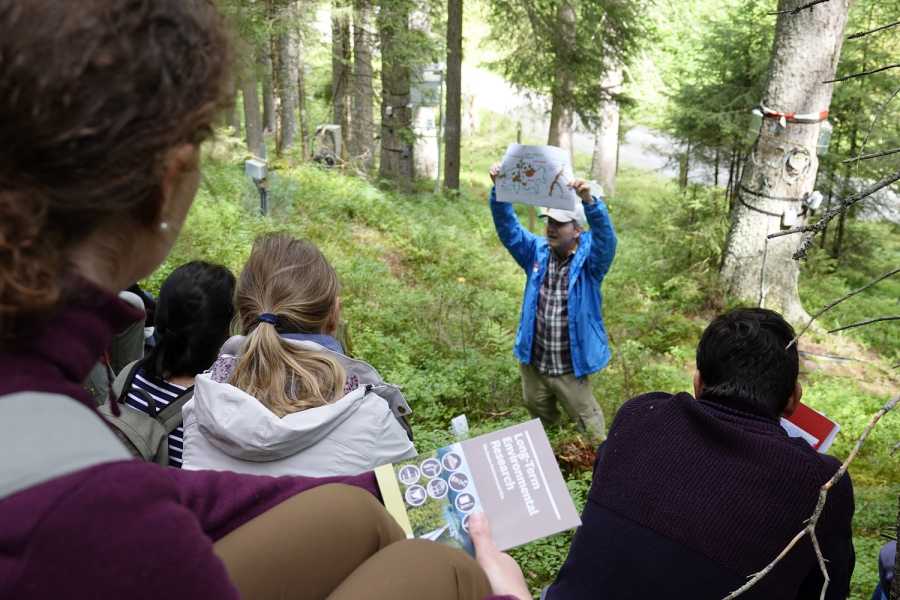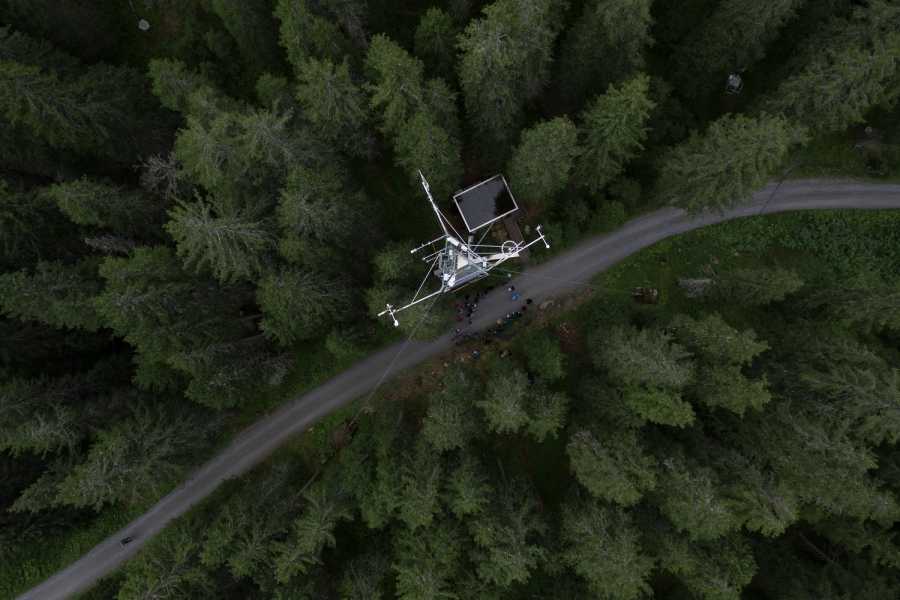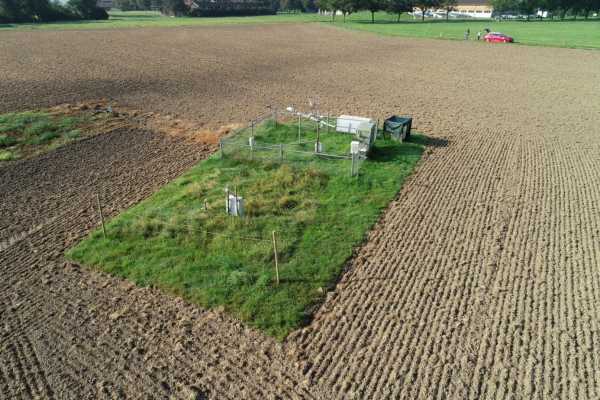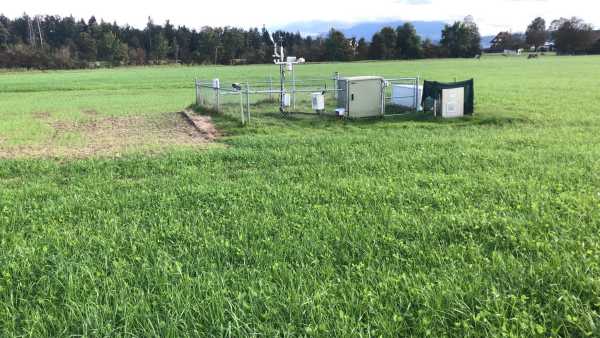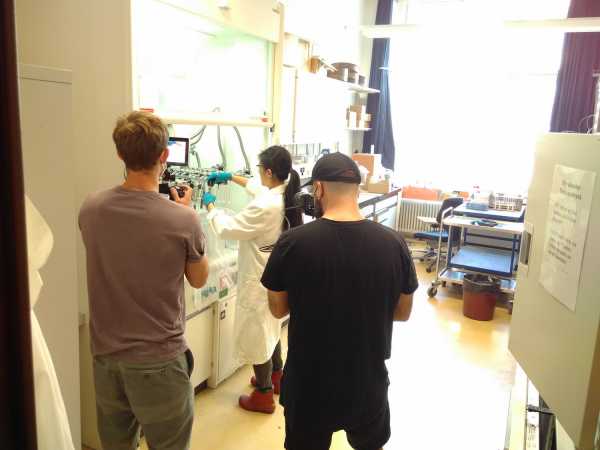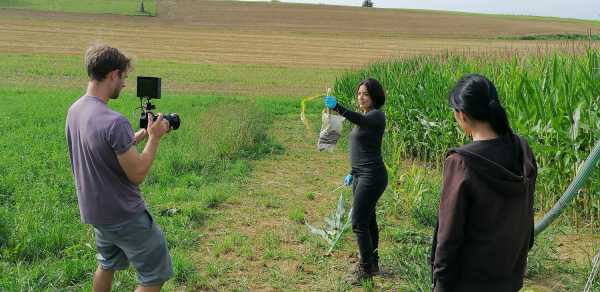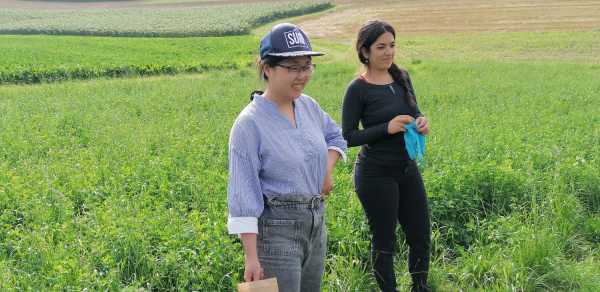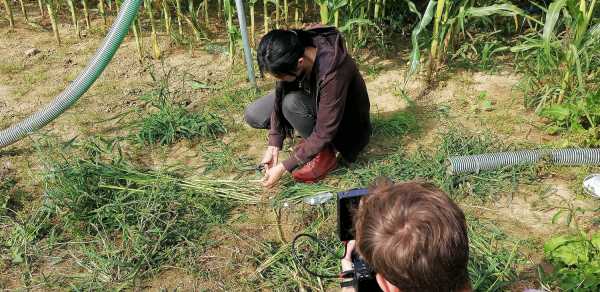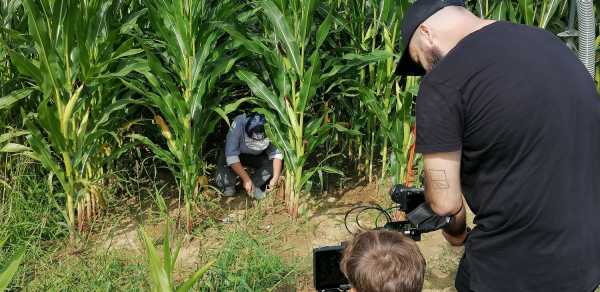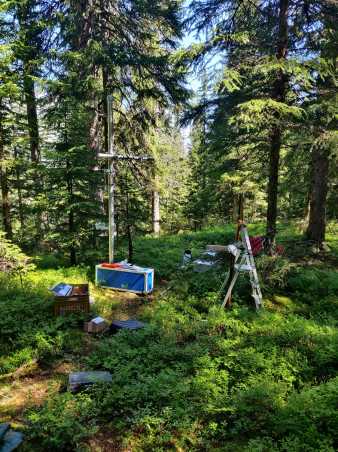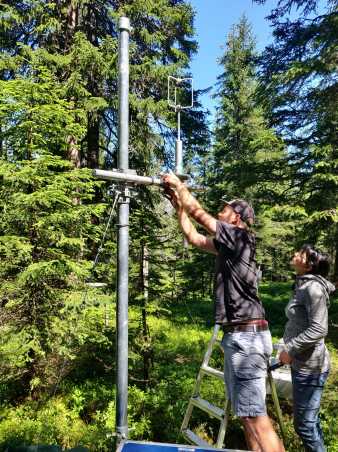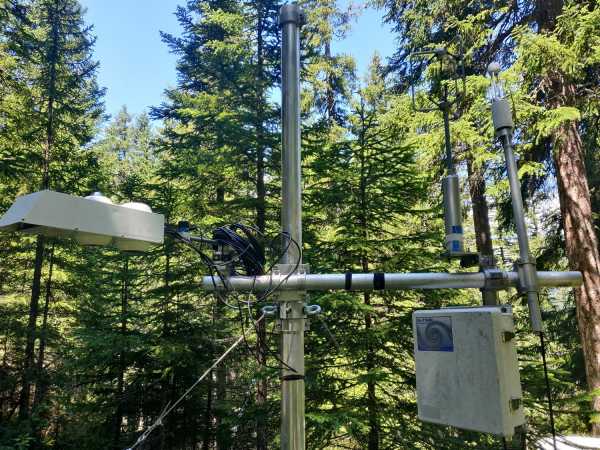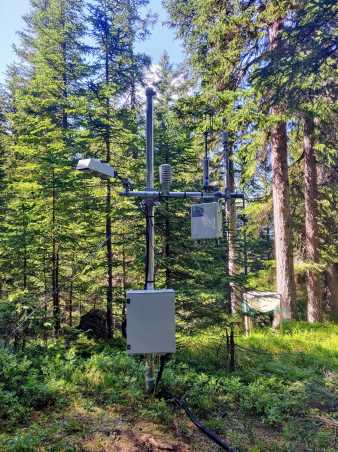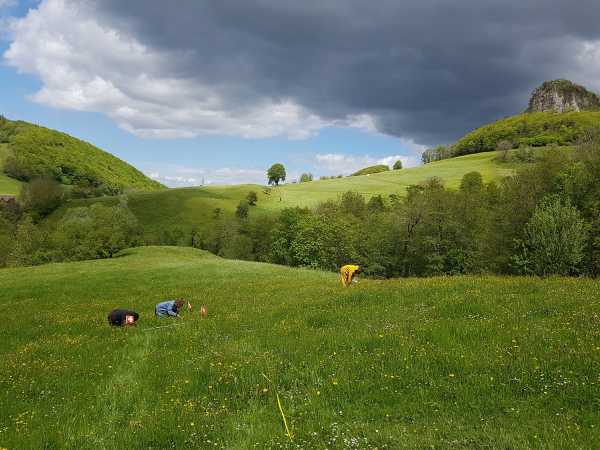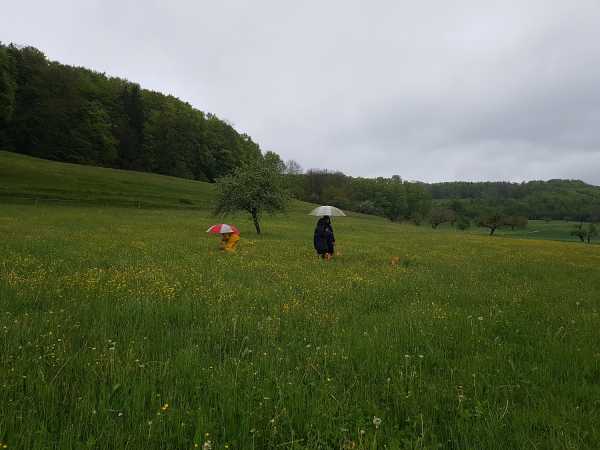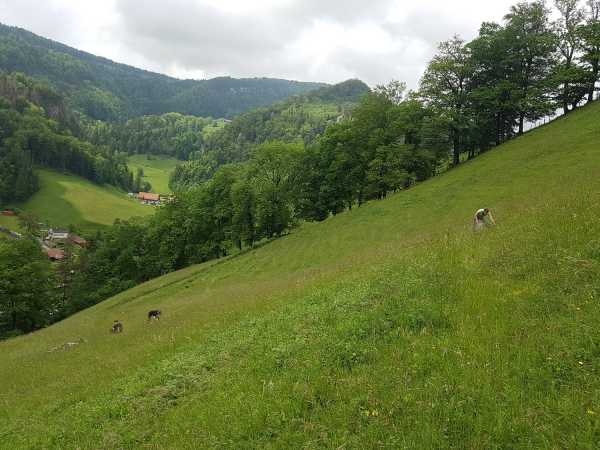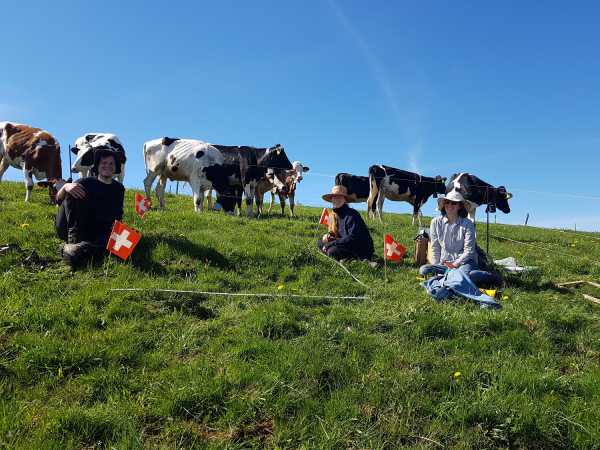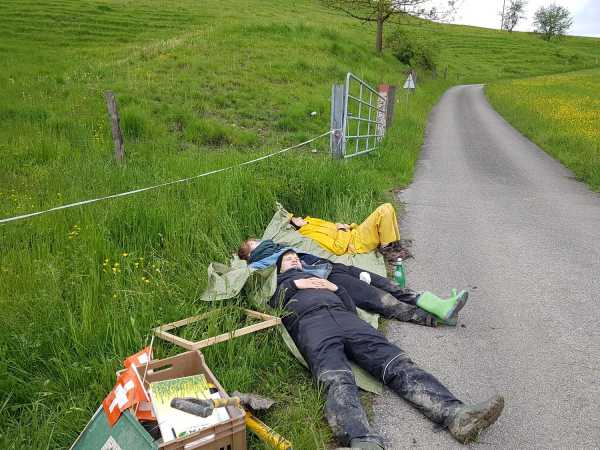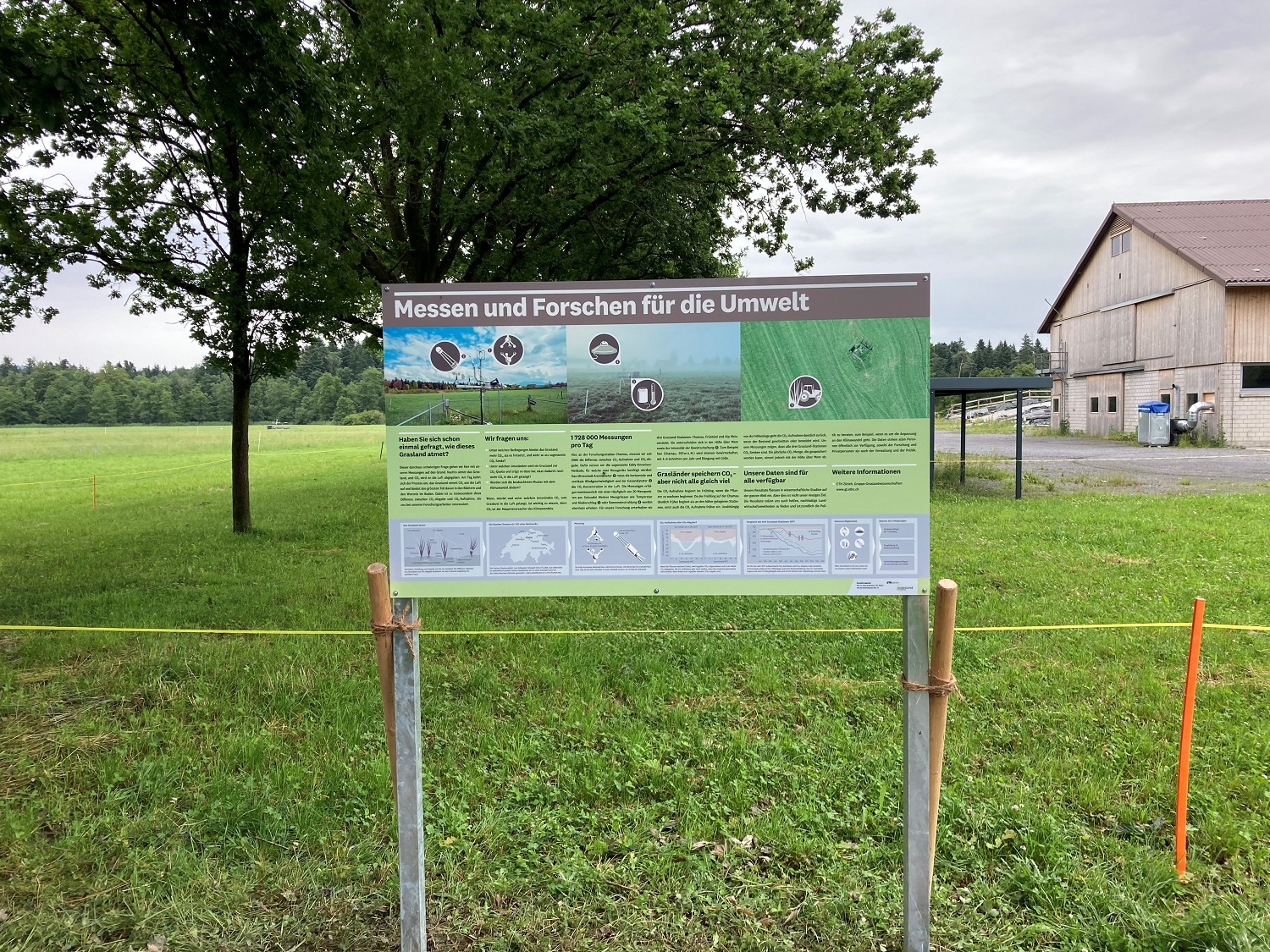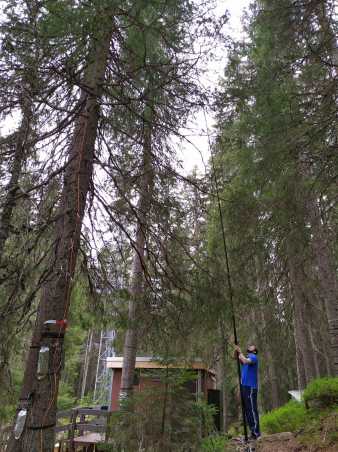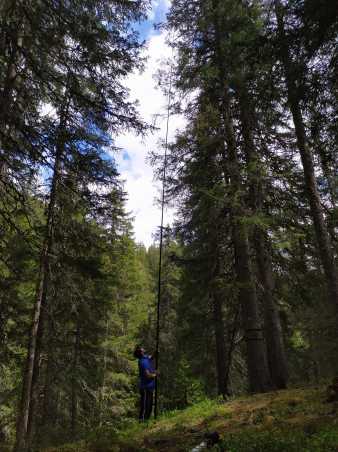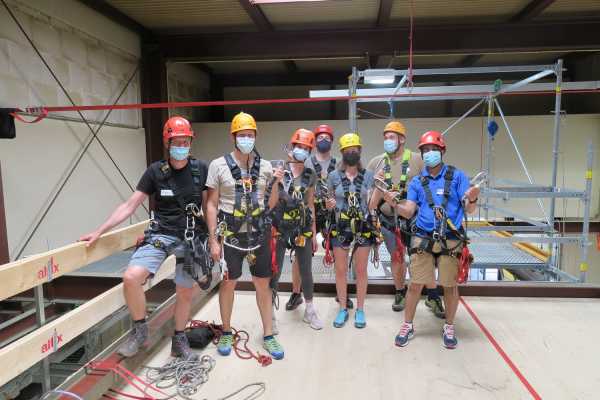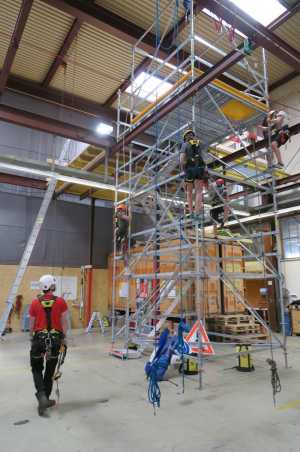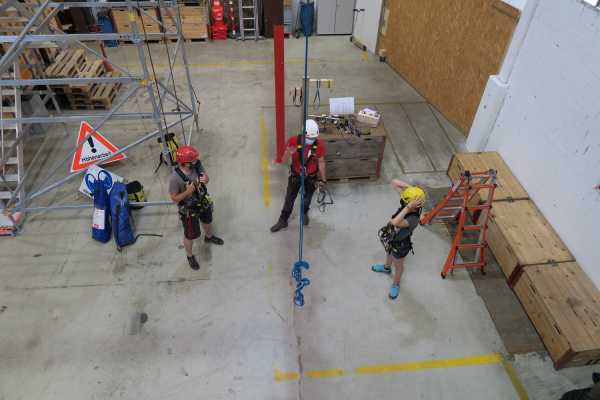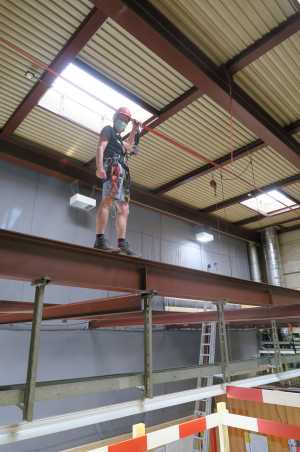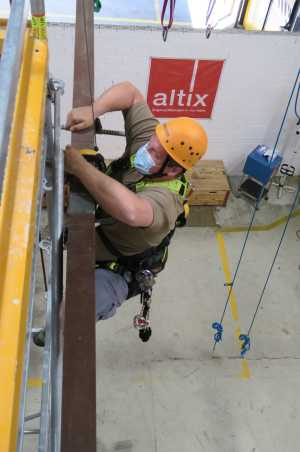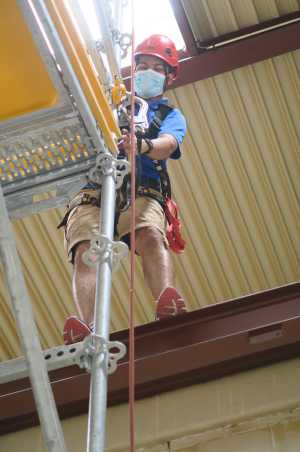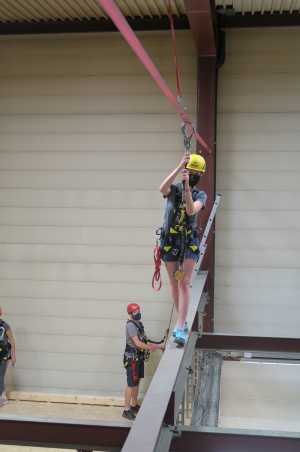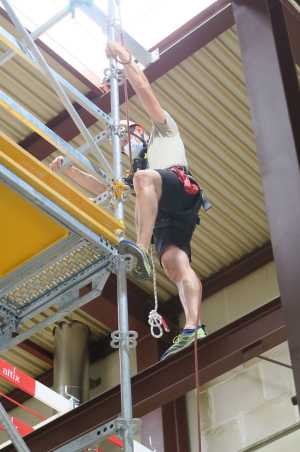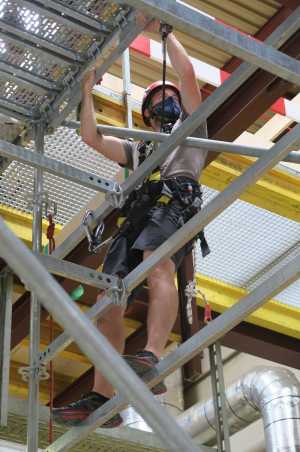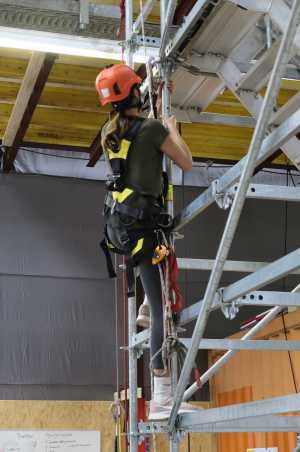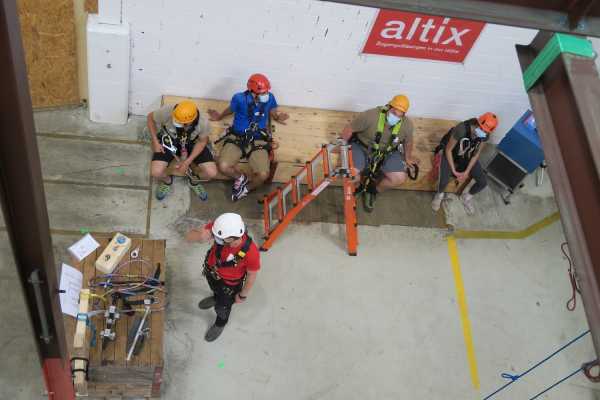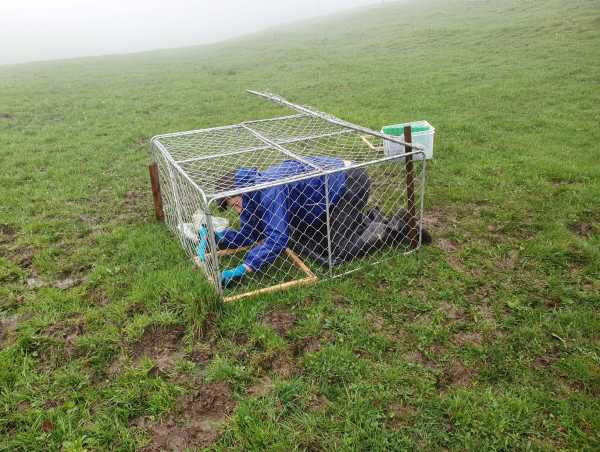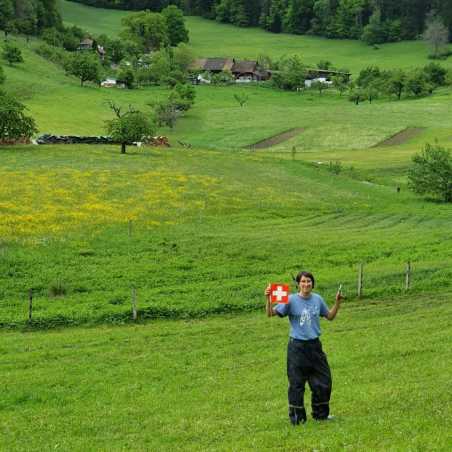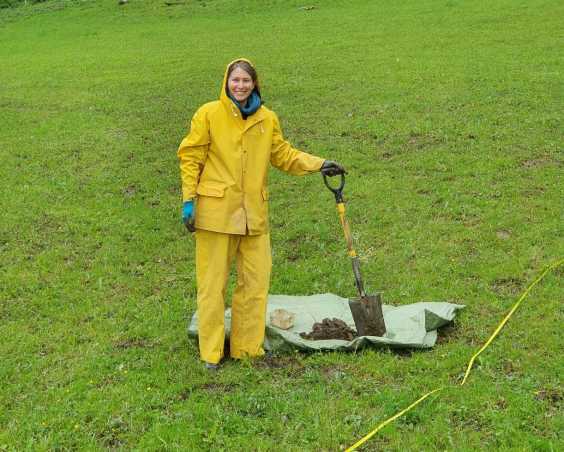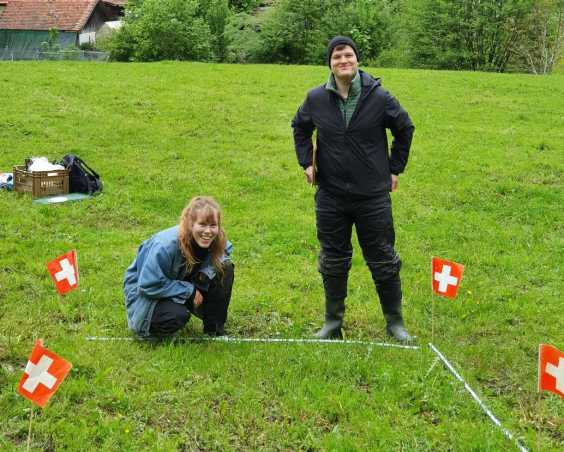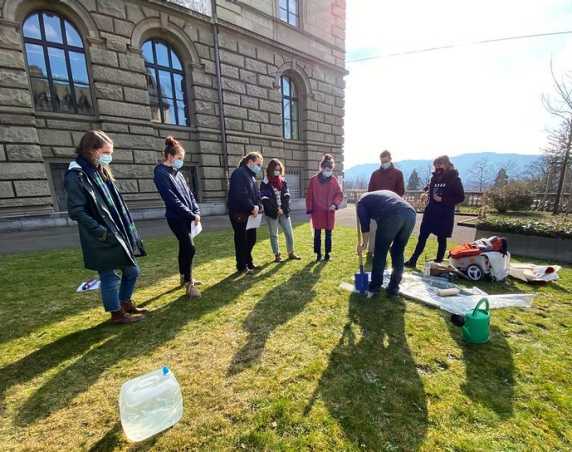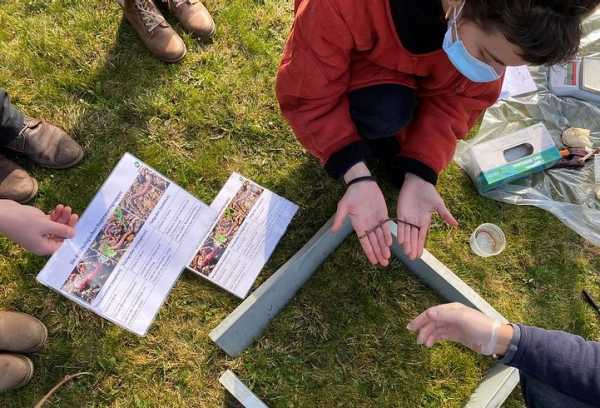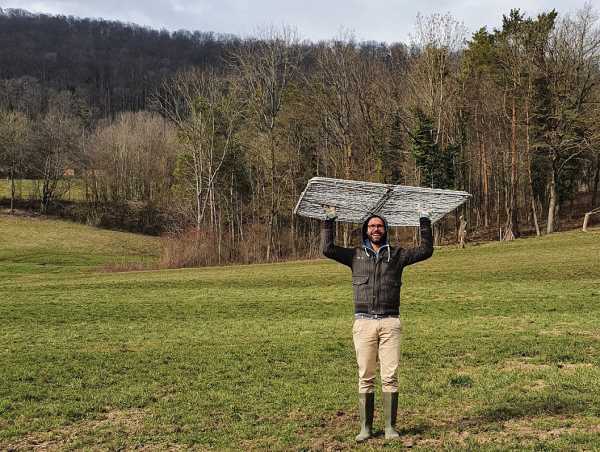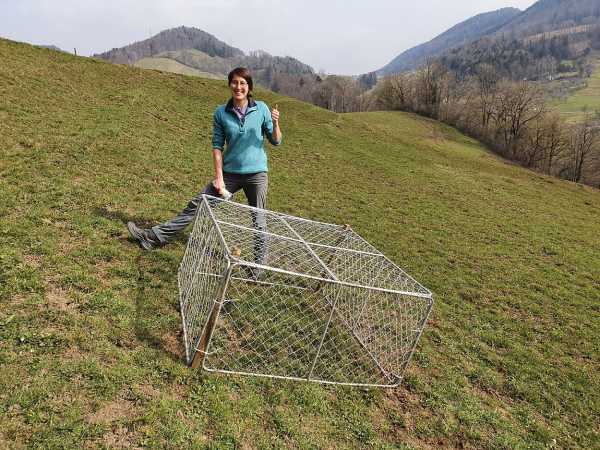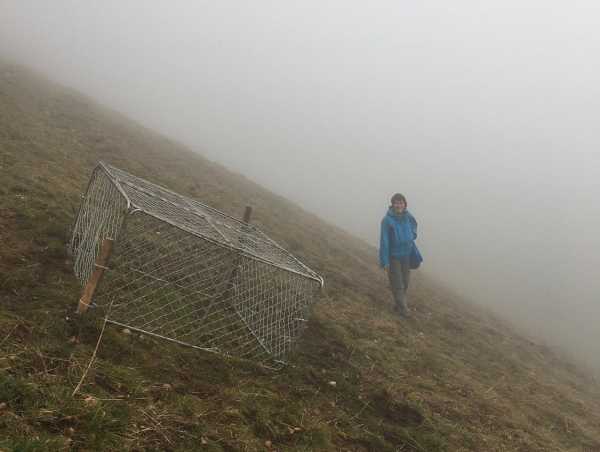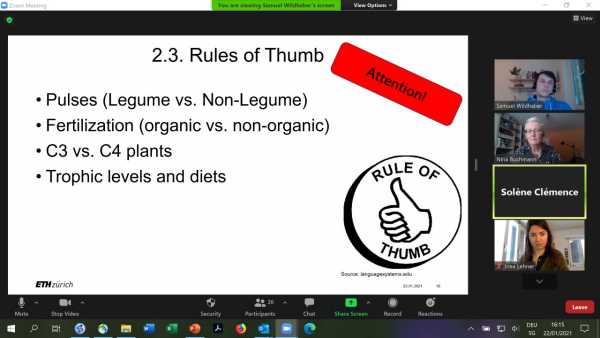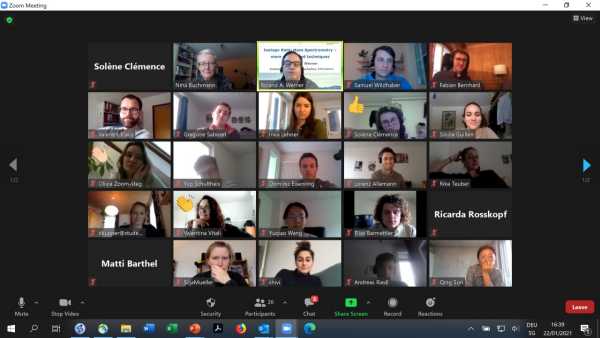2021
December
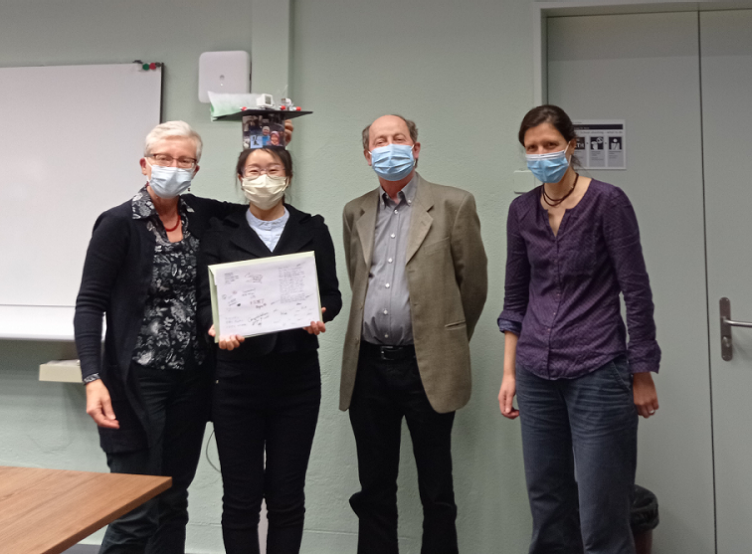
A last highlight before Christmas: Yafei Li sucessfully defended her thesis within the IFDewS project entitled "Effect of dew and fog on Swiss grasslands using stable isotopes of water". This was a virtual event again, professionally broadcasted from the video conference room in the ETH main building. Well done, Yafei! (22 December 2021)
For a quiz at our group's Christmas event, Ankit Shekhar looked at the group's publications since 2003. He found that by end of November 2021, we had published a total of 754 papers, books and book chapters. Ankit also analyzed the publications for the most frequently used words. Check out the word cloud below to find out about our research focus in the past 18 years. (7 December 2021)
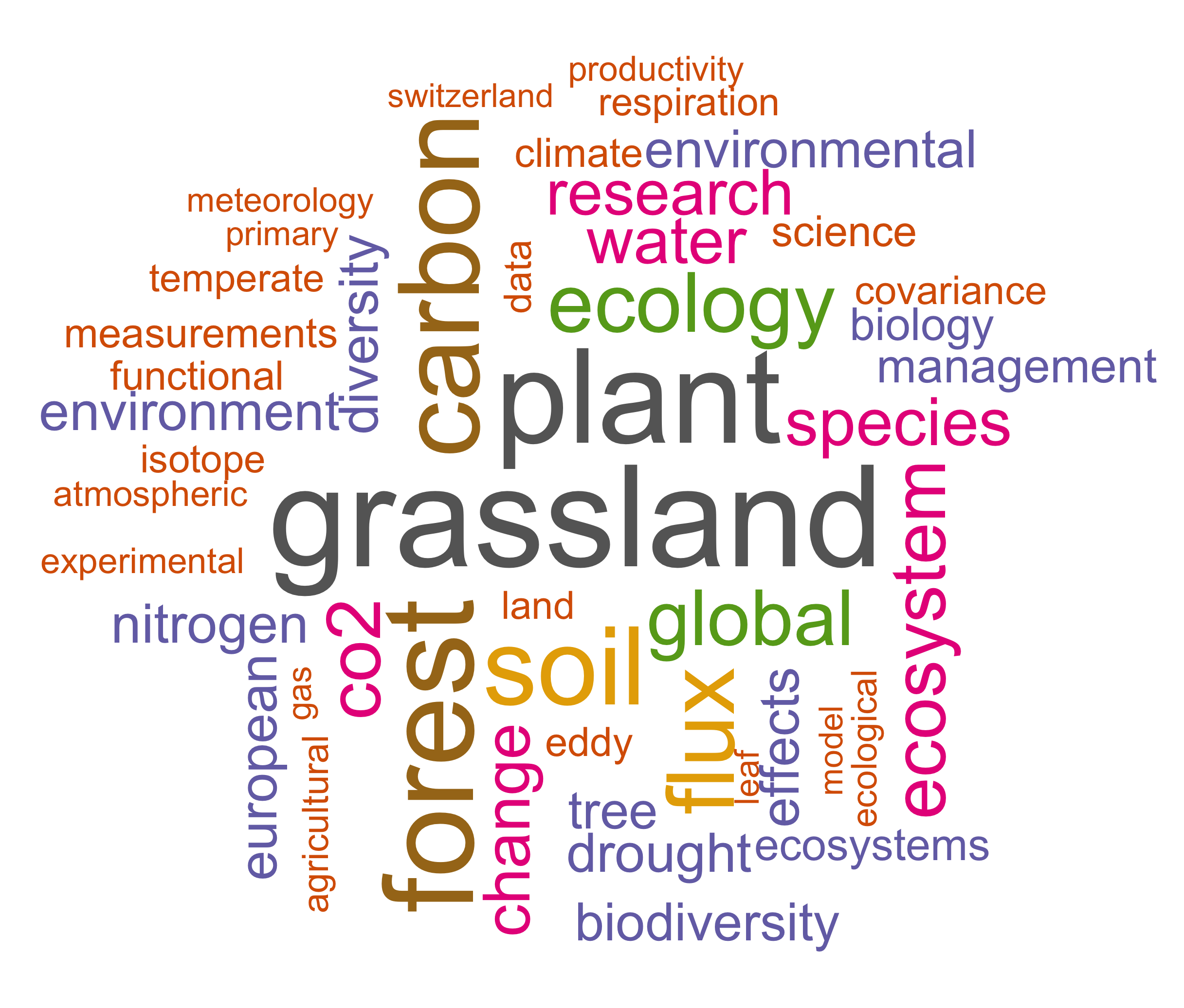
Nina Buchmann was invited to give a talk to the external pageInstituto Interuniversitario de Investigación del Sistema Tierra en Andalucíacall_made, University of Granada. Results from the Swiss FluxNet were the topic of her talk "Biosphere-atmosphere exchange and responses to long- and short-term environmental changes: results from the Swiss FluxNet". Thanks for listening and watching! (4 December 2021)
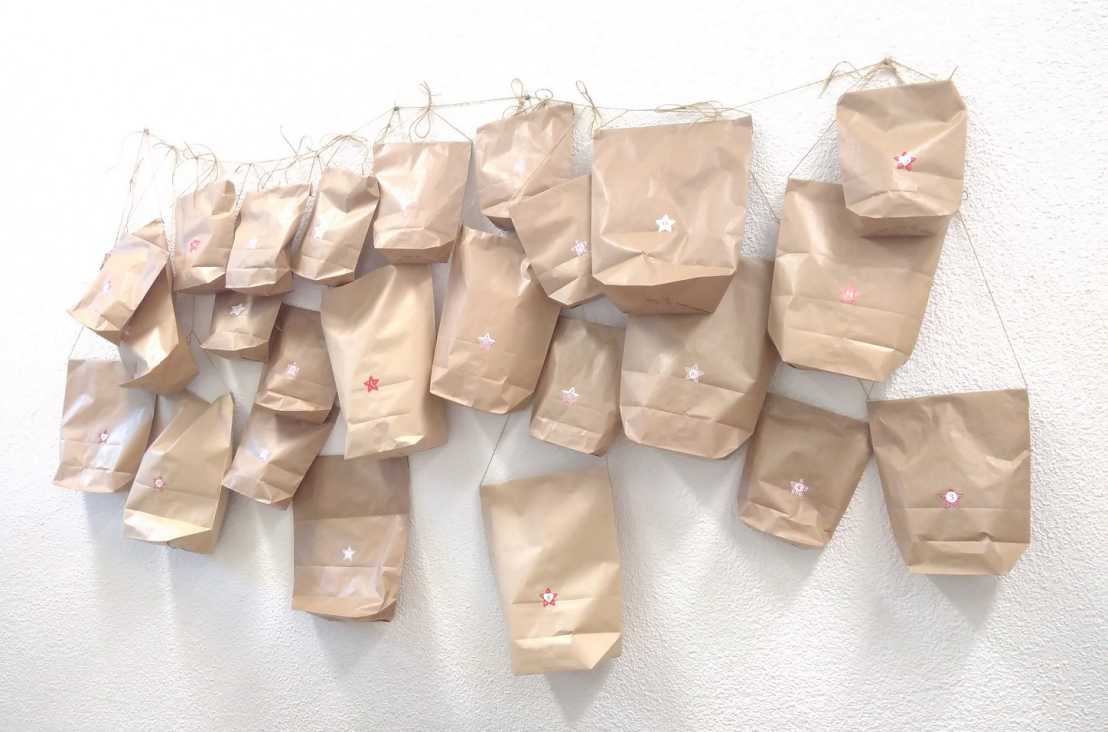
It is back! After it had to go virtual last year, the Grassland Advent Calendar is back in our coffee room. Twenty-four paper bags to be opened by whoever fulfills the criteria specified in the opening policy. We are looking forward to a month full of small surprises to sweeten and entertain the coffee breaks. Thanks a lot, dear Grassland Santas! (1 December 2021)
November
A field visit to one of the Spanish sites of external pagePenelope Ortizcall_made, University of Granada, starts the scientific discussions of Nina Buchmann, during her sabbatical in southern Spain: two eddy covariance towers within olive trees, all watered and fertilized. Penelope and her colleageus study the question what effect the understory vegetation has on CO2 and H2O vapor fluxes in olive plantations. (18 November 2021)
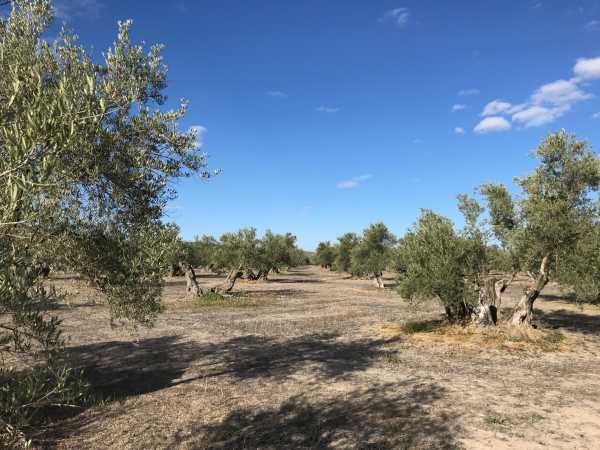 One of the important questions: what impact does the understory vegetation have?
One of the important questions: what impact does the understory vegetation have?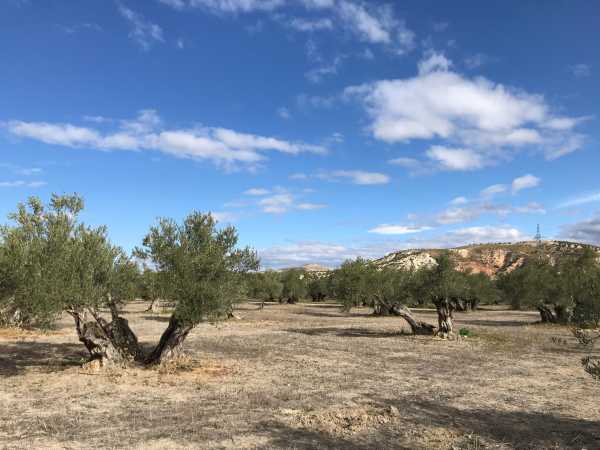 How to grow olives? One option is in a set of four
How to grow olives? One option is in a set of four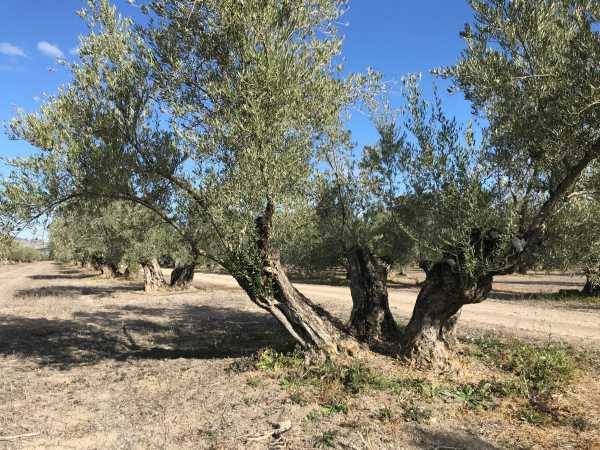 One of the eddy covariance sites of Penelope
One of the eddy covariance sites of Penelope 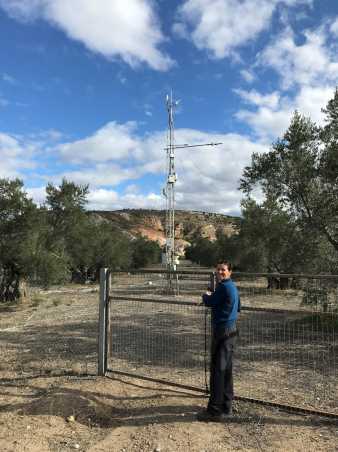 with a sub-canopy eddy covariance station
with a sub-canopy eddy covariance station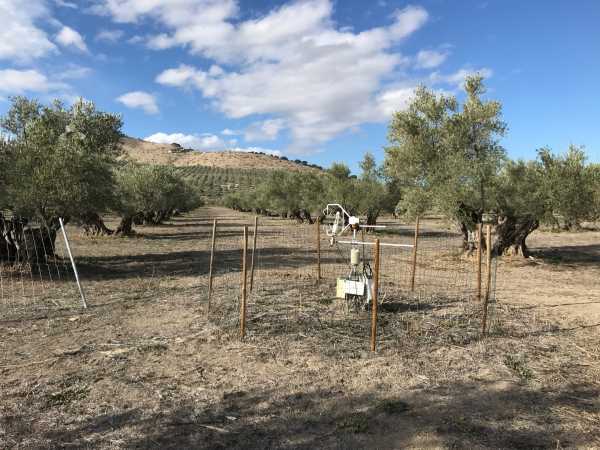 and automated soil respiration chambers, and much more...
and automated soil respiration chambers, and much more...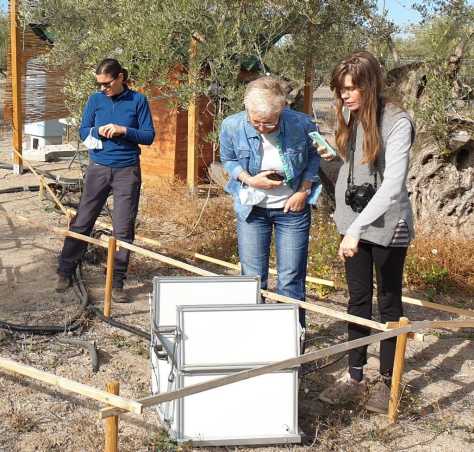
Every year around this time, fog is becoming a topic for the media. Our fog expert Werner Eugster was interviewed by the Coopzeitung, Switzerland's largest weekly newspaper, and explained why he is fascinated by fog. Among other things, he also mentioned our research site Lägeren (located in the area with most fog in Switerland). Read more in the article in the external pagefull newspapercall_made. (16 November 2021)
And here starts the second part of the sabbatical of Nina Buchmann, at Universidad de Granada with external pageAndy Kowalskicall_made and external pagePenelope Ortizcall_made. (15 November 2021)
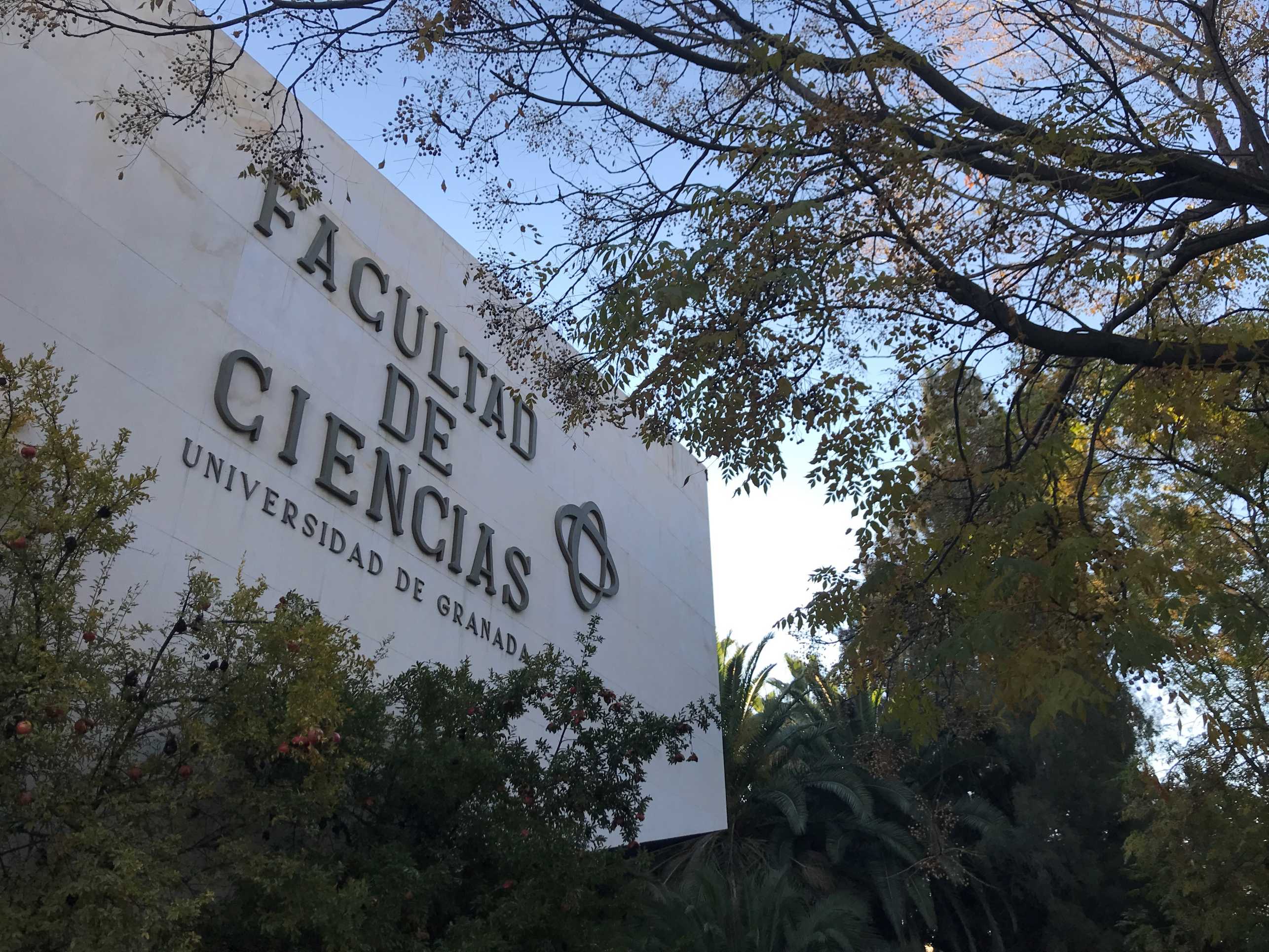

The group's outreach specialist Sabina Keller organized an event in the frame of the external pageNationaler Zukunftstagcall_made. Our group hosted six children between 10 and 14 years of age. These children discovered our various workplaces, from the sand room, to the climate chambers, the weighing room, the workshop, and the laboratories.
During their day in our group, the children could extract leaf pigments in the laboratory and examine stomata with a microscope, and solder a moisture sensor to take home in the workshop. The icing on the cake was express ice cream made with liquid nitrogen. It was an eventful day! Special thanks go to Philip Meier, Annika Ackermann, Anna K. Gilgen and Roland Werner, who substantially contributed to the success! And a big thank you to everyone else who helped. (11 November 2021)
October
What a change of scenery: Stefan Osterwalder and Markus Staudinger installed two newly built eddy covariance systems to study Hg0 fluxes in a natural and forested peatland in Sweden for the Eddy Mercury 2.0 project. One system is located at the external pageICOS-SE site Degerö Stormyrcall_made and the other system at the Hälsingfors site about 3 km apart. At Degerö and Hälsingfors the Hg0 fluxes are measured in about 2.2 m and 20.5 m, respectively, with a resolution of 16 Hz. The new systems were developed based on a first system deployed at our grassland site Chamau in summer 2018 (external pageOsterwalder et al. 2020call_made). Within this collaborative project between the ETH Zurich and Swedish University of Agricultural Sciences (SLU), we aim to capture diel to seasonal variations of the Hg0 flux and establish a reliable "standard" methodology to open the way for rapid progress in this area of Hg research. (20-27 October 2021)
The first part of the sabbatical of Nina Buchmann comes to an end, but a great Swedish tradition at CEC resumes: fika in the morning. After 1.5 years of homeoffice, the colleagues are super happy! (29 October 2021)
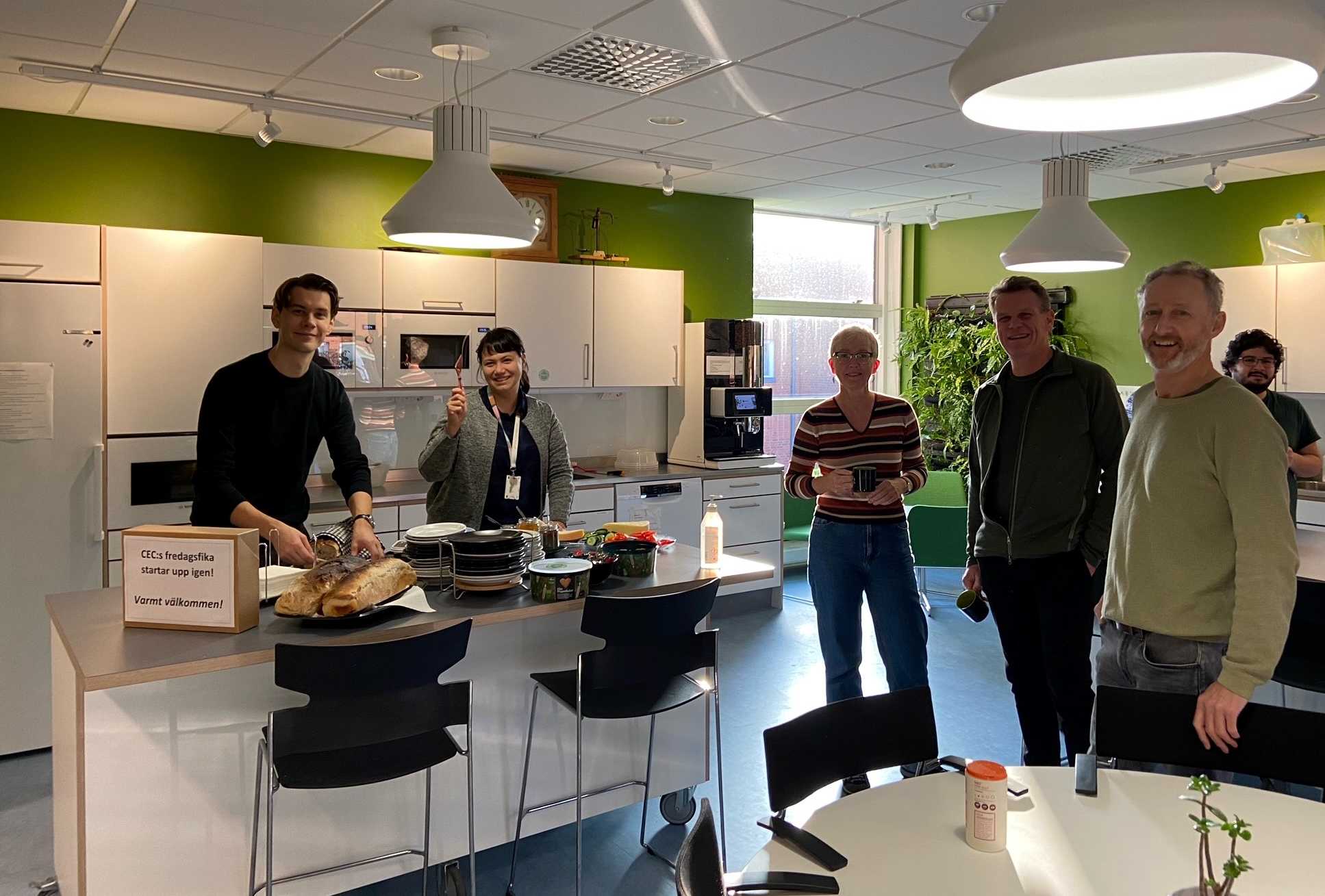
Exciting experience for the RELOAD doctoral students Emily Oliveira, Qing Sun (now Dr. Sun) and Yujie Liu. The three of them enjoyed an afternoon in the film studio to shoot the second part of the footage for the RELOAD project video. Being in the spotlight (quite literally) was a new experience for all of them, but it was also a lot of fun. Thanks to the perfect organization of the WFSC team, all went very well and we are looking forward to seeing the final product in due time. (20 October 2021)

A group of authors from the external pageICOS networkcall_made, among them Nina Buchmann, published the first comprehensive article describing the purpose and operation of the ICOS research infrastructure. Among other things, the article highlights how the high quality open and freely available data from ICOS contribute to more reliable results at a faster pace. Read more about the publication in the full news item or in the external pagefull articlecall_made. (18 October 2021)
A recent article in the Neue Zürcher Zeitung addressed the value of biodiversity in grassland. The article entitled "Biodiversität aus Bauernhand" (farmer-made biodiversity) also features Sergei Schaub's research on the positive relationship between plant diversity and yield in grassland published in external pageNature Communicationscall_made. (16 October 2021)
Valentin Klaus was invited to give a keynote at the 2. Hungarian Urban Ecological Conference in Győr, Hungary. Valentin was invited by the meeting organizer external pagePéter Batárycall_made to contribute to the conference (held in Hungarian, except for Valentin's talk). The talk dealt with "Options and limitations of nature conservation in cities". So good to see all the highly motivated colleagues doing urban ecological research in Hungary! (14 October 2021)
The second talk in Lund: Nina Buchmann presents the work of her team to the external pageDepartment of Physical Geography and Ecosystem Sciencecall_made and talks about „The Swiss FluxNet: Greenhouse gas fluxes, carbon budgets, extreme events, and the whole lot” (14 October 2021)
Field visit to one of the ICOS-SE sites, external pageHyltemossacall_made. ICOS-CH (Nina Buchmann) visits ICOS-SE ;-) (12 October 2021)
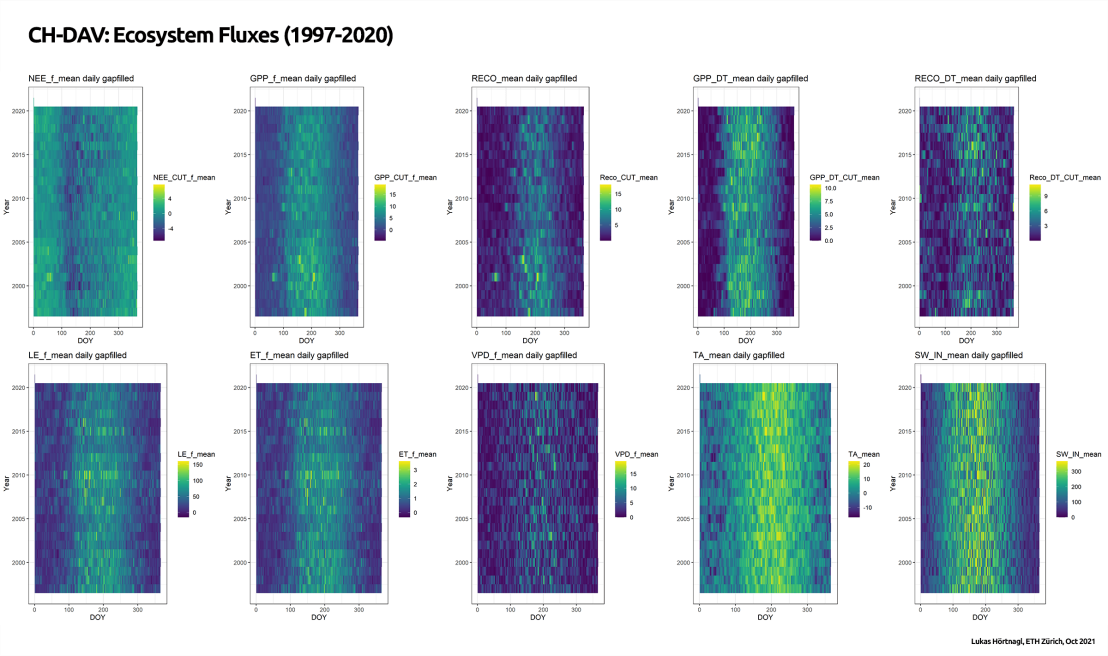
Our data scientist Lukas Hörtnagl has just released the preview version (release candidate 1) of the updated PI dataset for the Davos site, comprising twenty-four years of ecosystem fluxes. The PI dataset is generated bringing our best knowledge into processing and post-processing and does not rely purely on automated or very highly standardized processing. The updated dataset includes fluxes for NEE, GPP, RECO, LE and ET, as well as additional meteo data. A preliminary description and first plots of the dataset are available on the Swiss FluxNet webpage. (6 October 2021)
Nina Buchmann gave a talk to the external pageCECcall_made, the Centre for Environmental and Climate Science, at Lund University. She presented results on „Permanent grasslands: Linking land use & environment with biodiversity & ecosystem services”. This was the first talk in a external pageseminar seriescall_made to the CEC. Happy to open the series!!! (6 October 2021)
Learn more about the FORMON Summer School in Davos that Mana Gharun and Werner Eugster contributed to (see our August news) in this external pagenew videocall_made produced by WSL. If you look closely, you will also find some beatiful shots of our setup in Davos. (6 October 2021)
September
Andreas Riedl was invited by external pageMeteoSwisscall_made to give two presentations about dew and ground radiation fog inputs to Swiss grasslands at the forecasting training. So far, dew is not represented in the forecast models COSMO and ICON. Thus, the forecasters at MeteoSwiss are interested in dew and fog formation processes to improve the numerical weather predictions. Andreas gave two similar presentations, because the forecasters at MeteoSwiss have day and night shifts and therefore they couldn’t attend the presentation at the same time. (30 September 2021)
Great recognition for the work of our guest researcher, Martin Jiskra: His article entitled “Mercury stable isotopes constrain atmospheric sources to the ocean” was published in Nature yesterday. Martin and his colleagues could show that only half of the mercury in the ocean originates from rainfall (and not almost all of it, as previously assumed). The other half originates from direct deposition of gaseous mercury. Reducing manmade mercury emissions may hence result in a faster response of mercury in the ocean, including in seafood, than long assumed. Find out more in the external pagepress releasecall_made or read the external pagefull articlecall_made. (30 September 2021)
An international team of researchers was able to show that terrestrial ecosystem functions can be described by just three key indicators: the capacity to maximize primary productivity, the efficiency of using water, and the efficiency of using carbon. Nina Buchmann is one of the co-authors of the article entitled "The three major axes of terrestrial ecosystem function" that was just published in Nature. For the study, the authors used data covering various climate zones and vegetation types and analyzed them using multiple methods. Learn more about the findings in the external pagepress releasecall_made of the Max Planck Institute for Biogeochemistry, Jena or in the external pagefull articlecall_made. (22 September 2021)

This year's ICOS-CH Annual Meeting took place successfully at ETH Zurich. Extra efforts and a lot of back and forth thinking due to COVID-19 regulations were necessary for ICOS-CH coordinator Susanne Burri to make the on-site meeting happen. But it was worth it! Despite certificate requirements and wearing masks during all sessions, the ICOS-CH consortium was very happy to finally meet again in person after two years!
Besides updates from the external pageNational Networkcall_made as well as from external pageICOS RIcall_made, the program also included scientific presentations and lots of time to just enjoy good food and chat to each other - something which has become rare these days! This was especially important since new partners from University of Basel joined ICOS-CH beginning of July 2021 and will be part of the ICOS-CH station network with an urban station in Basel. Finally, the ICOS-CH consortium thanked Martin Steinbacher (ICOS Atmosphere MSA chair) for his tremendous work as MSA vice chair (2013-2019) and MSA chair (since 2019 and until the end of this year). (22 September 2021)
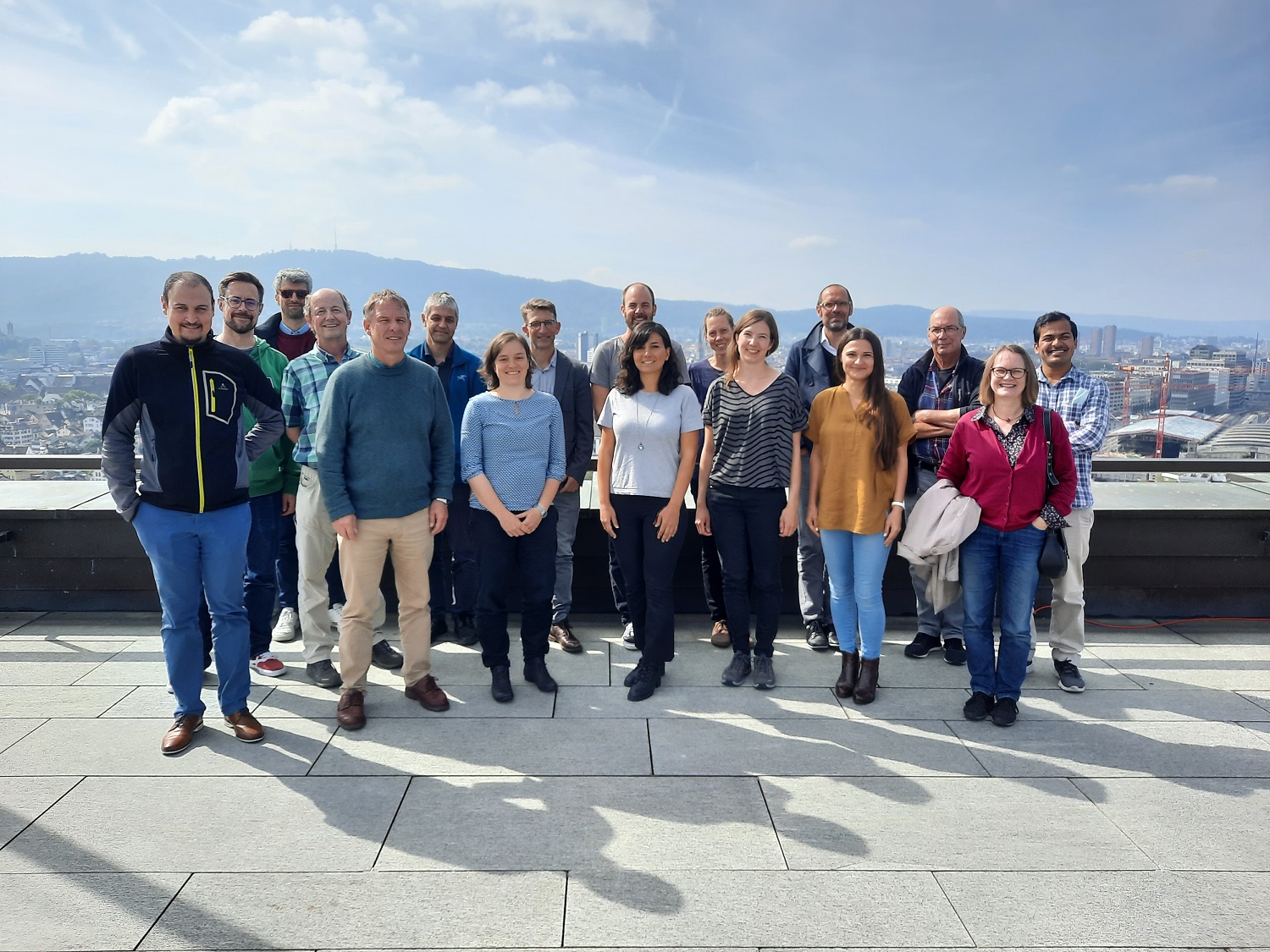
Sabbatical, this means exploring a new university, spending time on science, discussing with old and new colleagues. Nina Buchmann went up north, to Lund University, where her colleague external pageNatascha Kljuncall_made had a warm welcome for her! (6 September 2021)
The 19th Swiss Climate Summer School entitled "Vegetation, Land Surfaces and Climate Interactions" took place at the Congressi Stefano Franscini on Monte Verità. During hands-on workshops, Werner Eugster and Mana Gharun taught the students about eddy covariance (EC) and plant-level ecophysiological measurements. Especially for this purpose, Werner and Mana set up an EC system beginning of the week and the students analyzed fluxes measured directly from the lawn. For ecophysiological measurements, students sampled different plant functional types and compared their measurements. They used porometers to learn how to measure stomatal conductance and to determine plant water relations, and the Scholander bomb for leaf water potential measurements to assess plant water stress. Students really enjoyed working outdoors in the magnificent environment on Monte Verità. (29 August-3 September 2021)
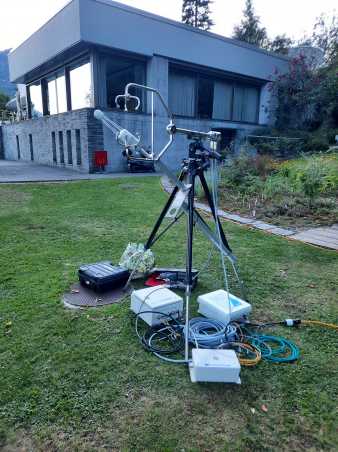 Werner introducing the EC technique to the students.
Werner introducing the EC technique to the students.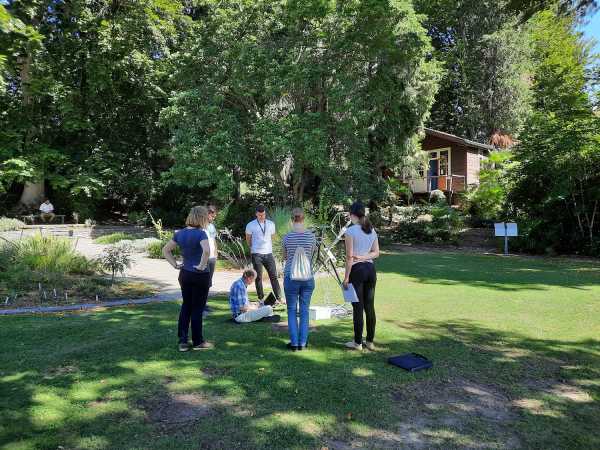 Porometer measurements to assess plant water relations.
Porometer measurements to assess plant water relations.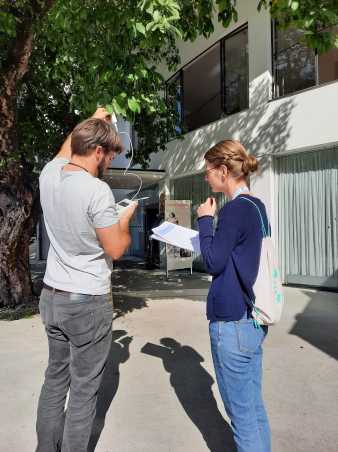 Collecting samples on site to find out how stressed the olive tree might be.
Collecting samples on site to find out how stressed the olive tree might be.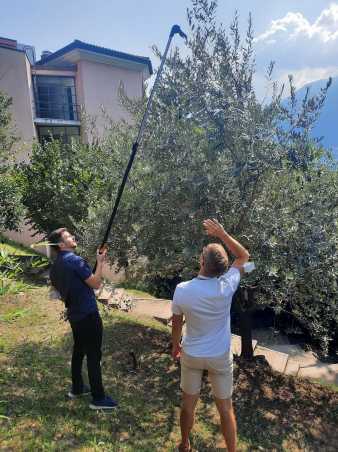 Mana explaining the ecophysiological measurments to two students.
Mana explaining the ecophysiological measurments to two students.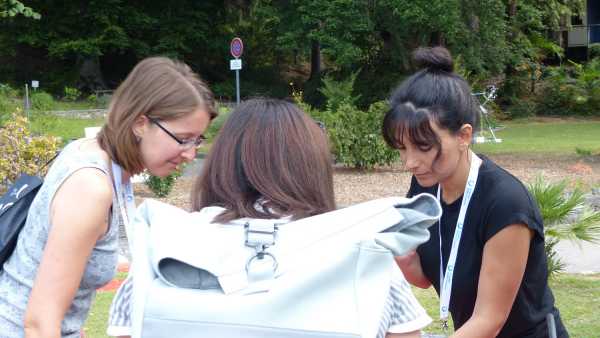 Assessing the leaf water potential of freshly collected samples.
Assessing the leaf water potential of freshly collected samples.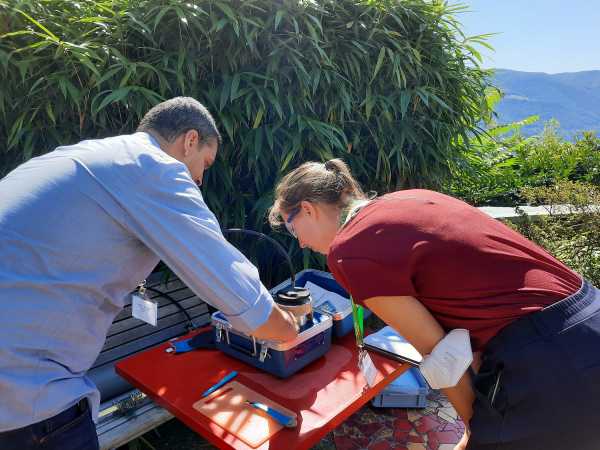 What a magnificante location! Taking leaf water potential measurements with an amazing view over Lago Maggiore.
What a magnificante location! Taking leaf water potential measurements with an amazing view over Lago Maggiore.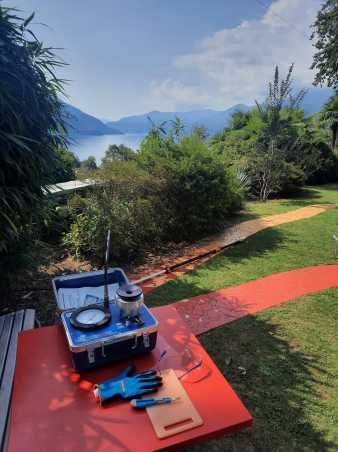
August
At the end of August, Mana Gharun and Werner Eugster contributed to the Summer School FORMON - Long-term Forest Monitoring organized by external pageICP Forestscall_made, the external pageSwissForestLabcall_made and external pageNFZ.forestnetcall_made in Davos. Mana and Werner took the participants on an excursion at our site in Davos. The students highly appreciated that the lectures could be combined with a physical visit to a forest site, a long-term research hotspot, and an external pageICOS Class 1 ecosystem stationcall_made. (22-28 August 2021)
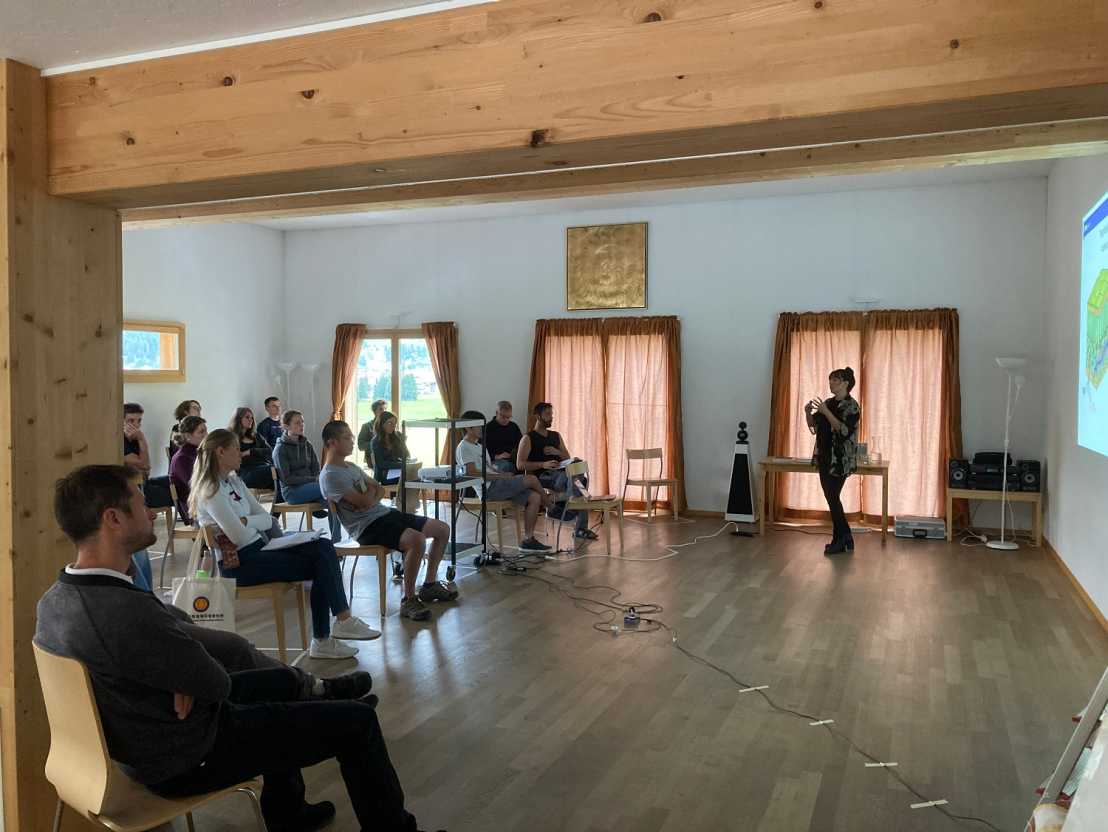
Mana Gharun was invited to present a keynote lecture at the FORMON summer school in Davos. Mana's presentation was entitled "Forest‐climate interaction observations: rewards and challenges". (27 August 2021)
Quite literally turbulent times for our grassland station at Chamau, which is part of the project SUPER-G. An event that happens about every 8-10 years took place on 20 August: a renewal of the grassland sward with tillage and reseeding ("Hobelsaat"). Last time this was done in 2012 (see external pageMerbold et al. 2014call_made) and also this time we observed high greenhouse gas emissions after tillage. About 1.5 months later, the vegetation was almost fully established, and the site looked like a grassland again. (20 August 2021)
The three RELOAD doctoral students Qing Sun, Emily Oliveira and Yujie Liu starred in a video shoot for the WFSC project video in the lab and in the field. The WFSC team and film crew shot footage for the project video that will be completed with interviews later this year. (17 August 2021)
Anna K. Gilgen joined the WFS Summer School and talked about climate change, biodiversity and food systems. The international group of 22 students from various disciplines spent a day in Eschikon to learn about ETH research in Agricultural Sciences. (16 August 2021)
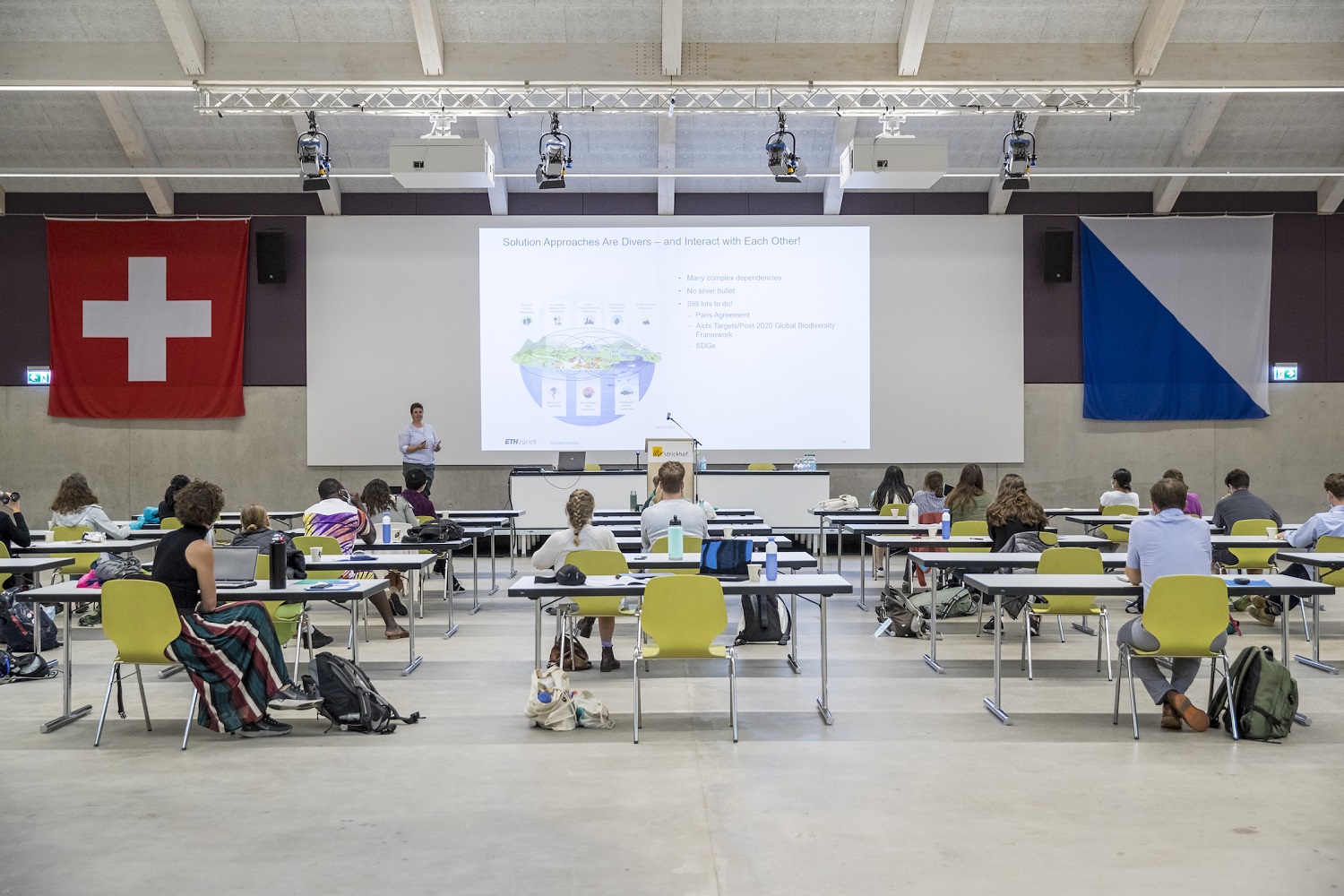
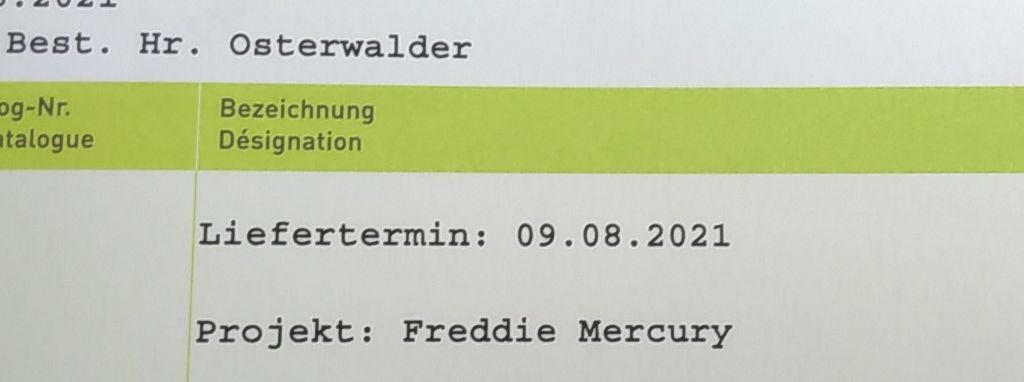
Project acronyms are often hard to create. But sometimes they are obvious - at least to us. Others might think we mistyped the word. As much as we love "We are the champions" and other Queen songs - the project is really called Eddy Mercury. (11 August 2021)
July
A new station is born! Philip Meier, Mana Gharun and Luana Krebs installed the new sub-canopy station in Davos. The new station CH-DAS will be used the COCO project. Looking forward to the first results. (29 July 2021)
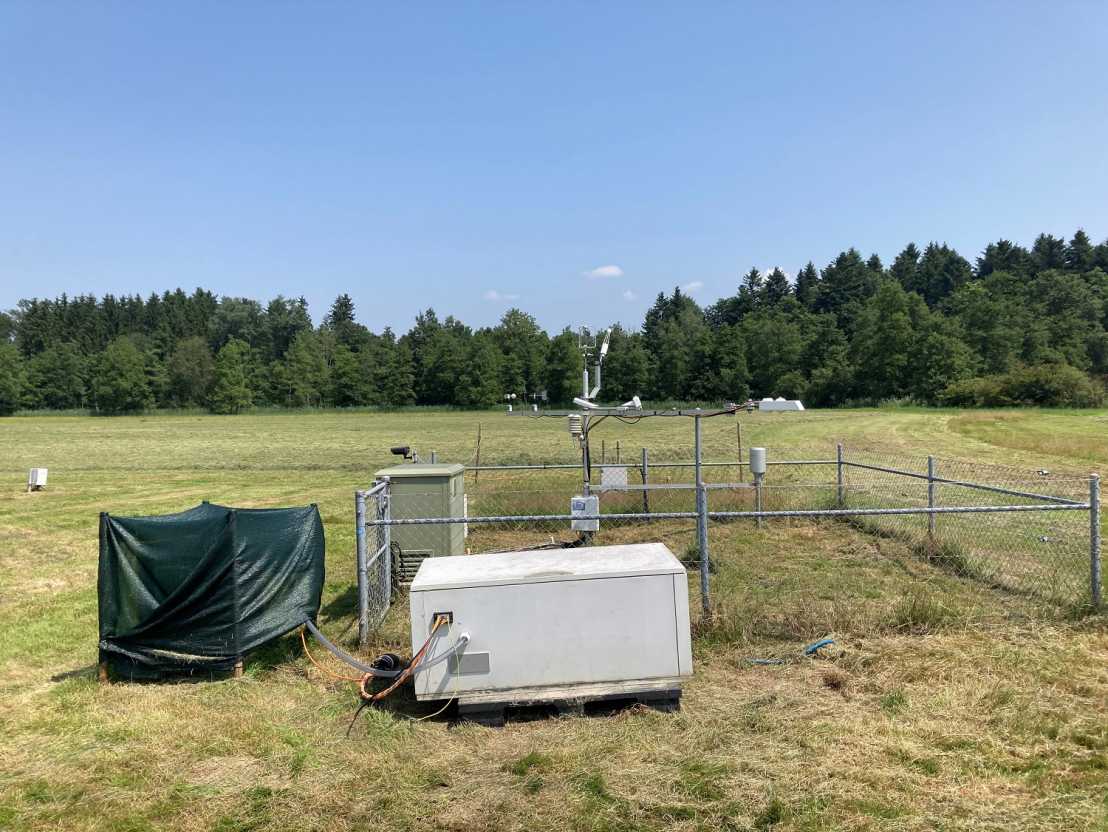
In an intensive 1.5 week endeavor, the new laser LGR was moved to Chamau and is now running smoothly. This was only possible thanks to a great joint effort of our technicians Philip Meier, Bruno Pfister and Markus Staudinger, doctoral students Iris Feigenwinter and Regine Maier, and Werner Eugster. Real team work - well done. (22 July 2021)
... better late than never! Last month, the one and a half month long ServiceGrass field campaign ended. The team consisting of three motivated interns and Franziska Richter made many measurements on "their" 94 grasslands in the Canton of Solothurn, including among others vegetation relevés, earthworms abundance, and biomass harvests. A big Thank You to the interns, who were always motivated - despite some unpleasant weather conditions and long working hours! (16 July 2021)
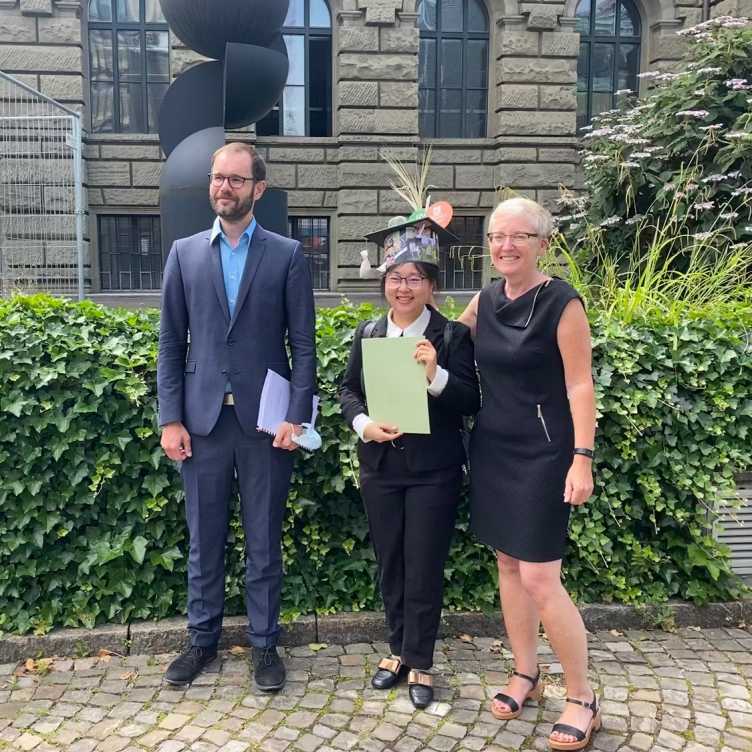
Finally, an on-site defense again. Yujie Liu sucessfully defended her thesis entitled "Ecosystem functioning of arable land in response to cropping systems and drought". This was the second defense in the RELOAD project within one week. Congratulations, Yujie! (12 July 2021)
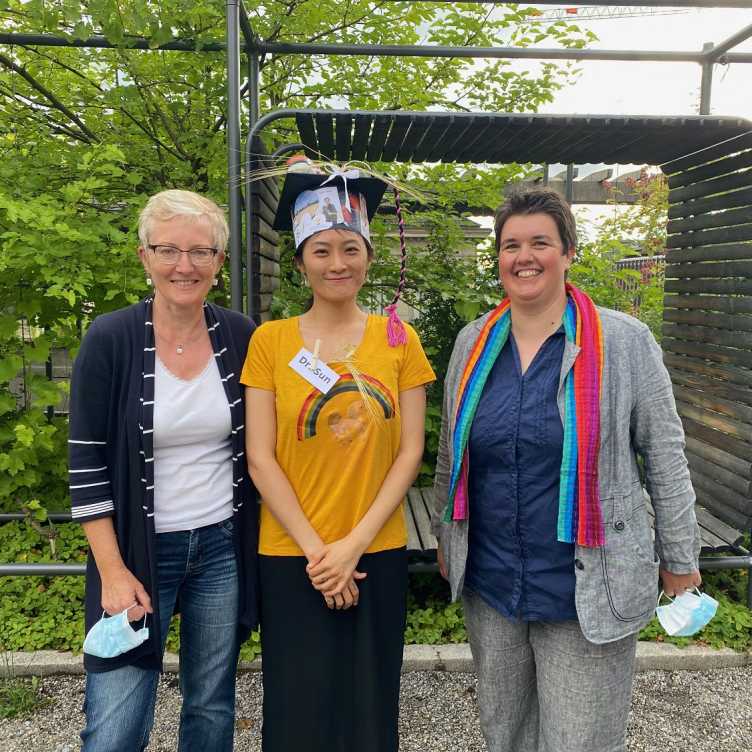
Congratulations to Qing Sun for a successful thesis defense! Qing defended her thesis entitled "Plant water relations in response to drought and different cropping systems" that was part of the RELOAD project. The virtual defense was broadcasted from the video conference room in the ETH main building - luckily, we were able to meet for a real apéro on our roof terrace afterwards. (7 July 2021)
Our new infoboard is now installed at Chamau. The board informs by-passers about the research ourgroup has been doing at this grassland site since 2005, explains the basics of eddy covariance, and displays some of our research findings. A big shoutout to Susanne Burri who was responsible for this outreach effort. The infoboards for all our other sides are ready for installation, too. (5 July 2021)
We welcome Stefan Osterwalder to the group. Stefan joins us as a postdoc with his own project, Eddy Mercury 2.0. In this project, he will work on grassland-atmosphere exchange of Hg0 using the eddy covariance technique. (1 July 2021)
June
News about rETHink: at today´s townhall, all Working Streams presented their results from the analysis phase. Nina Buchmann, co-leading Working Stream 2, talked about their findings and current discussions about professorships. (29 June 2021)
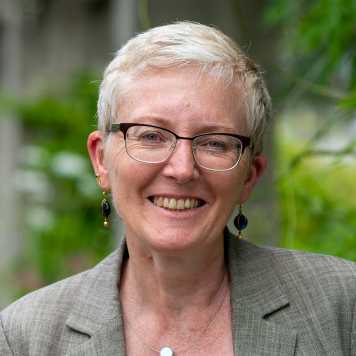
In an interview published in the ETH News today, Nina Buchmann looks back on 150 years of Agricultural Sciences at ETH, how research and teaching changed over time, and the value of Agricultural Sciences then, today, and tomorrow. Nina also talks about the nine years in the Department's leadership and about her plans for the near future. Read the full interview in the ETH News. (25 June 2021)
Andreas Riedl presented his work in the IFDewS project at the 34th Conference on Agricultural and Forest Meteorology. His presentation entitled "Novel High Accuracy Weighing Micro-Lysimeter System for Long-Term Measurements of Non-Rainfall Water Inputs to a Grassland” was considered of very high quality in all categories - scientific quality, aesthetic quality, and presenter demeanor - and won second place in the student presentation award for oral presentations. Congratulations, Andreas! Check out the external pageabstractcall_made, if you are interested. (21 June 2021)
The FEVER fieldwork got a new legendary (based on Ankit's assessment) tool added to its arsenal – the 15 m high telescopic sickle. Cutting branches from a 13 m high canopy has never been this easy, but some training is needed before one masters this skill.
Check out Ankit's performance in this external pagevideocall_made. (18 June 2021)
Welcome to Serena Dorner (University of Lund, Sweden) who joined us as external pageIAESTEcall_made exchange student for the next four months. We hope you enjoy your time in our team. (15 June 2021)
Safety first! Our technicians and the FEVER and COCO doctoral students took a one-day course to ensure climbing the towers at Lägeren and Davos remains safe for everyone. The tailored training in Winterthur focused on the personal protection equipment against falls ("Persönliche Schutz Ausrüstung gegen Absturz", PSAgA). The GL climbers learned and refreshed their knowledge about the PSAgA material, received specialized knowledge and practical exercises for people working in fall-risk areas, and performed a rescue of a climber. Now everybody has the official approval to climb the towers and collect exciting data. (14 June 2021)
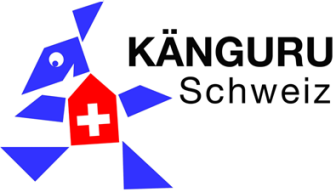
This year, the Kangaroo goes Science day was carried out completely virtually for the very first time. One hundred girls, the best of their class (level seven) who had taken part in the Kangaroo Mathematics Competition in March, were invited to visit ETH Zurich. The Grassland Sciences group organized two Plants and Sensors workshops for around 20 girls. The participants made and tested their own temperature sensor with the help of a kit sent to them beforehand. They learned about the European greenhouse gas measurement network external pageICOScall_made from ICOS-CH coordinator Susanne Burri, and climbed one of our measurement towers with Mana Gharun. The event was organized and coordinated by Sabina Keller. If you want to join Mana on our tower in Davos as well, check out this video. (11 June 2021)
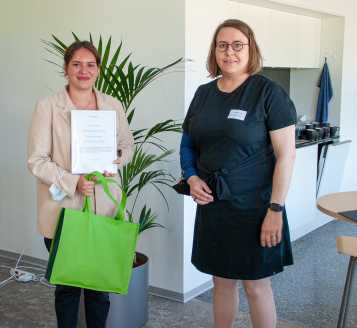
Congrats!!! Elisabeth Tanner receives the SVIAL Award 2021 in Agricultural Sciences, awarded for the best Bachelor thesis. Elisabeth wrote her Bachelor thesis about "Ammoniakemissionen am Forschungsstandort Früebüel: Einfluss der Landwirtschaft?" The award was handed over by Prof. Laura Nyström at the external pageGeneral Assembly of SVIALcall_made.
Valentin Klaus gave a public open-air talk at the external pageBotanical Garden of the University of Berncall_made. His talk entitled "Accuracy vs. wild growth - How do residents want their city's green spaces to be?" drew on Valentin's research on urban ecology. (10 June 2021)
„Responses of Swiss forests to long- and short-term environmental changes” was the title of the keynote, Nina Buchmann delivered at the external page9th Scientific Conference of ICP Forestscall_made “Forest Monitoring to assess Forest Functioning under Air Pollution and Climate Change”. (8 June 2021)
Congratulations to Julian Rogger who carried out his Master thesis with us: he received the Willi-Studer Award of Agricultural Sciences for the best graduation of his cohort. (3 June 2021)
Welcome to Luana Krebs who started today in our group today. Luana will do her doctoral thesis within the COCO project, together with Liliana. We are looking forward to working with you and have a good start! (1 June 2021)
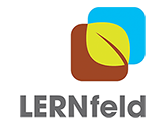
external pageGLOBEcall_made is inviting Swiss schools to investigate environmental topics with GLOBE methods and protocols and to submit a poster to the external pageGLOBE Contestcall_made. Schools can win exciting prizes, e.g. participation in a national student's conference or interesting excursions. Our outreach project LERNfeld is among the research activities to choose from. external pageCheck it outcall_made. (1 June 2021)
May
After nine years in the departmental leadership, five years as vice-chair and four years as chair, Nina Buchmann chaired her last PK and DK, i.e. the D-USYS Professors´Conference and Department´s Conference. (21 May 2021)
What would we do without student helpers? Almost nothing! For the ServiceGrass projects they are vital - and as this year’s May weather is particularly muddy and harsh. Project PI Valentin Klaus and doctoral student Franzi Richter therefore say a big THANK YOU to all helpers fighting the rain for data and scientific evidence! (19 May 2021)
Congratulations, Dr. Bruggisser! Moritz Bruggisser successfully defended his doctoral thesis entitled "lmproving Forest Mensurations with High Resolution Point Clouds" at TU Wien. Since April this year, Moritz is applying his knowledge in the EcoDrive project. We're very happy that Moritz can do so as a full-fledged postdoc now. (18 May 2021)

At the VMUSYS general assembly Iris Feigenwinter and Francesco Giardina got elected to the VMUSYS board together with other new board members from different institutes. They are joining Valentin Klaus who is the current treasurer of VMUSYS. Congratulations and looking forward to contributing to activities in the Department! (6 May 2021)
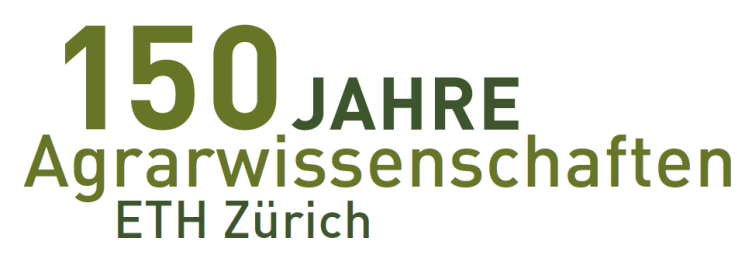
Big anniversary event for the Agricultural Sciences at ETH Zurich! The Agricultural Sciences kicked off the celebrations for their 150 years anniversary with the premiere of the anniversary film. In this film, Nina Buchmann and other members of the institute give an insight into today's Agricultural Sciences and how things changed compared to 150 years ago. The premiere was followed by a series of webinars and a lively apéro. Watch the film and read interesting articles about the rich history of Agricultural Sciences at ETH Zurich on the anniversary page or find out about the media response. (4 May 2021)
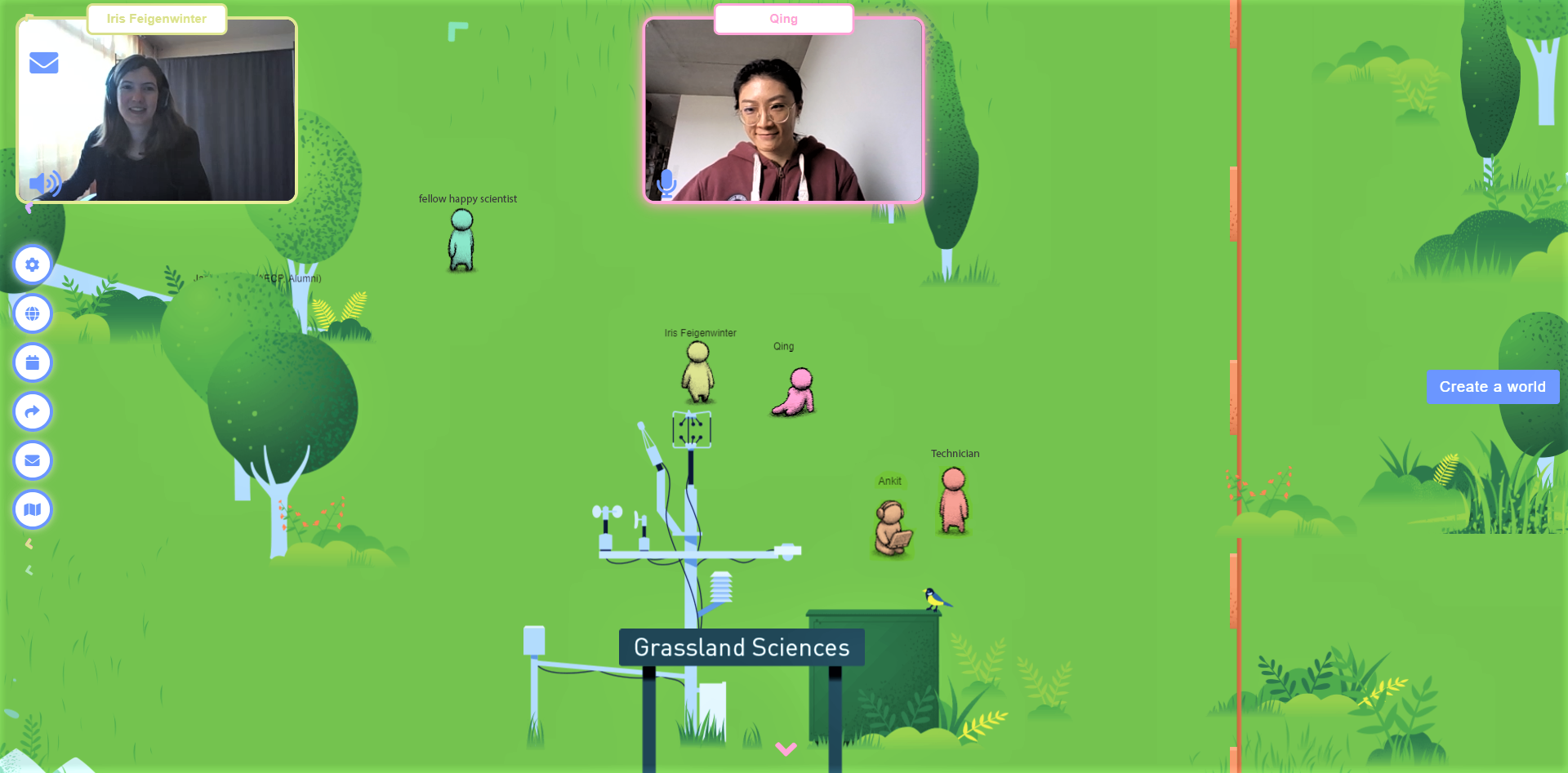
While writing a proposal, we did some bookkeeping on our IsoLab measurements. The results are really impressive. We got our two isotope ratio mass spectrometers (IRMS) in early 2004 and ran the first actual measurements in July 2004. Since then, our two IRMS, Burns and Convertino, have delivered a wealth of data for 30 projects, 35 doctoral theses within our group (and probably some more in other groups), and more than 130 peer-reviewed papers. In total, our former (Karin Grassow-Sörgel) and current (Annika Ackermann and Roland A. Werner) IsoLab staff has run over 320'000 analyses. What an achivement! Currently, nine of our doctoral students use stable isotope analyses for their thesis - so, there's more to come. (1 May 2021)
April
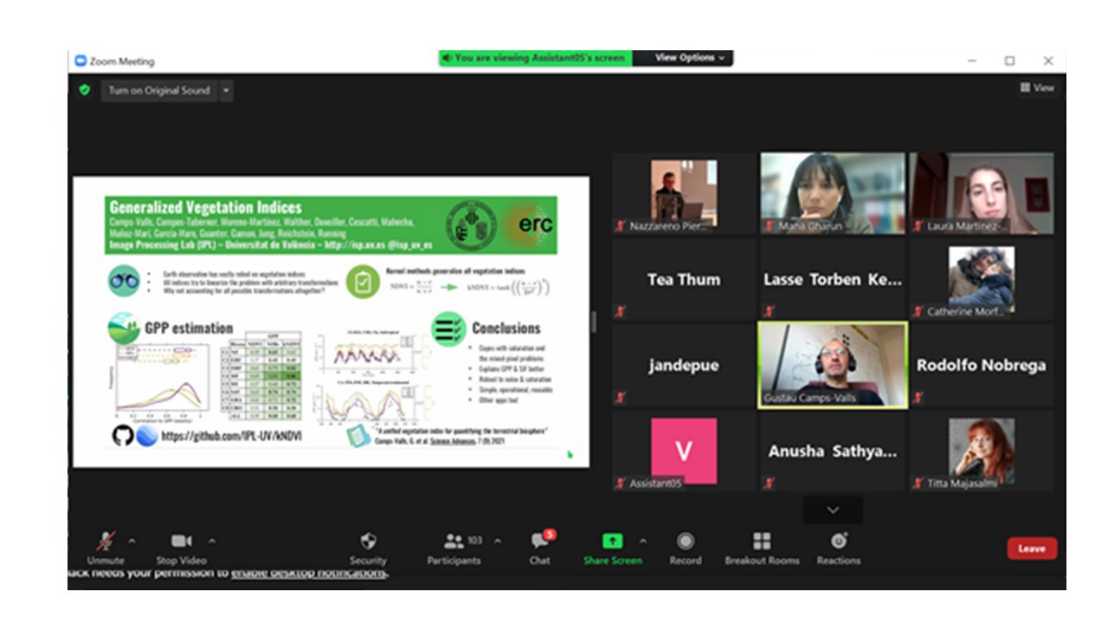
Mana Gharun convened a external pagesessioncall_made at this year's EGU. The conference, usually hosted in Vienna, took place virtually for the second time. Mana's session was a great success – more than 100 people joined to see the presentations and participate in the very nice discussions. How good to see that despite all physical limitations, participants still managed to hear about the latest research, interact and even extend their scientific network. Well done, Mana. (30 April 2021)
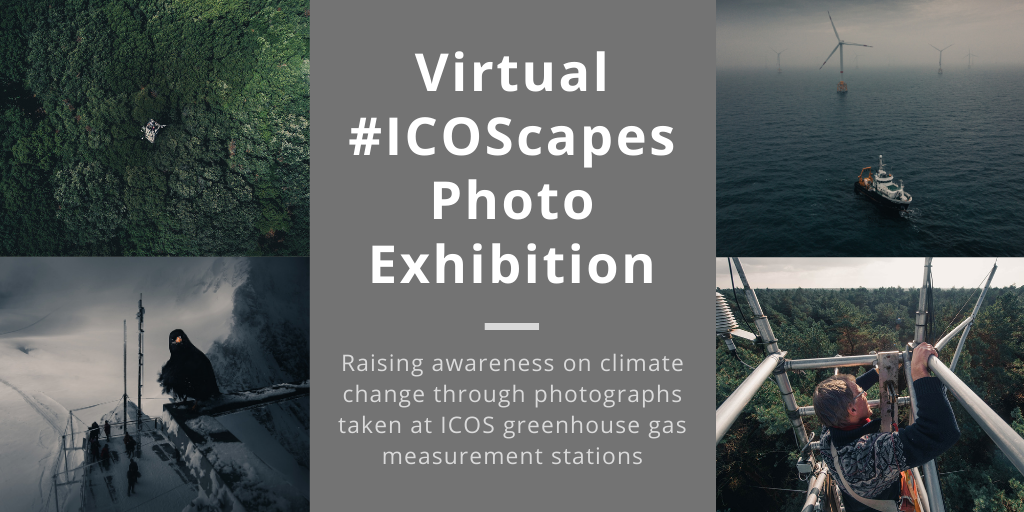
ICOS launched the virtual #ICOScapes Photo Exhibition today! "Travel" to ICOS stations all over Europe and explore the very unique environments that host ICOS stations. The ICOS-CH station Jungfraujoch is featured as well. Enter the exhibition external pageherecall_made! (26 April 2021)
Excursions are an important element of teaching in Agricultural Scienes. Fortunately, they are still possible, despite the Corona situation. One such excursion lead Bachelor's students to the external pageAgroVet-Strickhofcall_made site Früebüel at 1000 m a.s.l. Different aspects of agricultural research were presented, from animal sciences to micrometeorology. Iris Feigenwinter presented the Grassland group’s measurements and current research at the eddy covariance tower. Luckily it was a warm and sunny day, a welcome change to the usual home office! (23 April 2021)
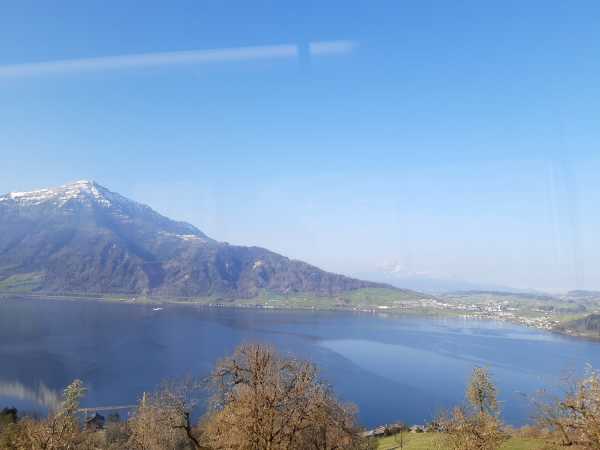 In the cow barn with Hubert Pausch and Claudio Bowald.
In the cow barn with Hubert Pausch and Claudio Bowald.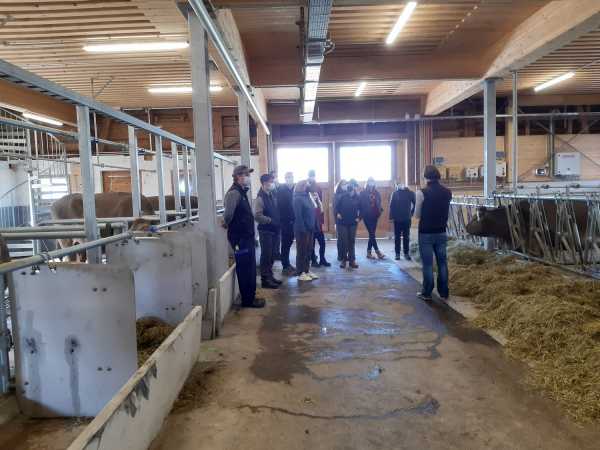 Original Braunvieh
Original Braunvieh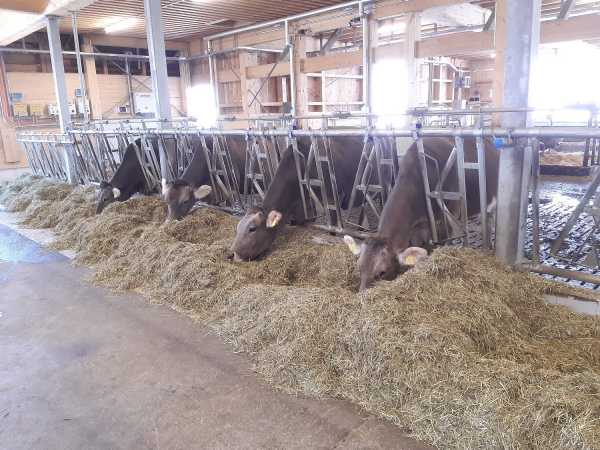 Male sheep (Bock) on the right, watching his herd.
Male sheep (Bock) on the right, watching his herd.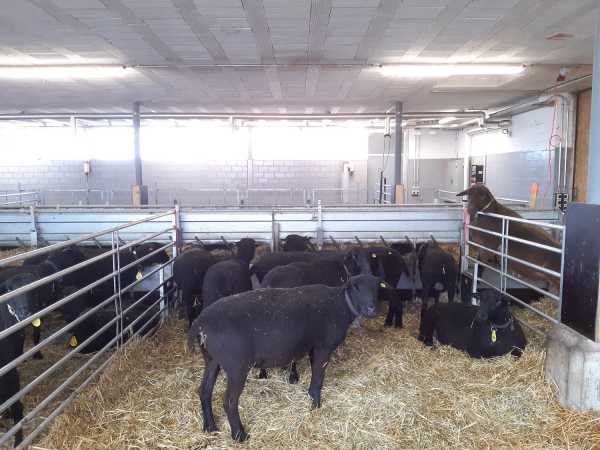 Hans Rudolf Wettstein and Stefan Neuenschwander presenting the sheep farming at Früebüel.
Hans Rudolf Wettstein and Stefan Neuenschwander presenting the sheep farming at Früebüel.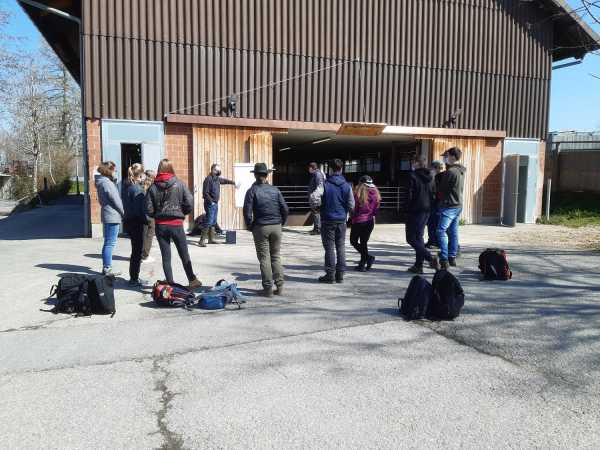 Iris presenting the eddy covariance station to the students.
Iris presenting the eddy covariance station to the students.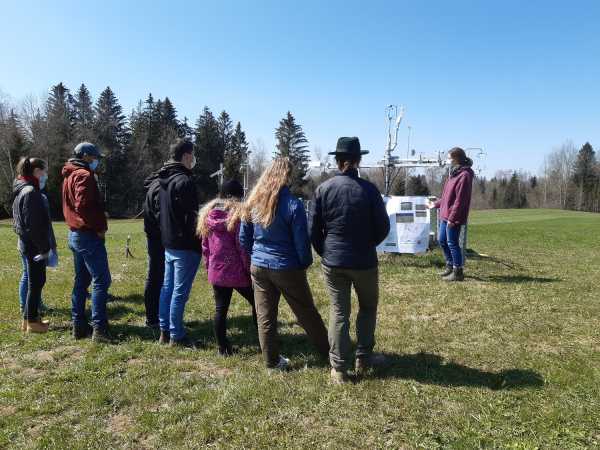
Science for Policy? Climate change needs to be stopped, but how to transmit the urgency to policy-makers? What is the duty of scientists studying climate change? Should we or even must we voice our concern? Over 100 scientists from Swiss universities and research institutions have issued a external pagestatementcall_made in support of the CO2 act. Among those signed, also Nina Buchmann. (22 April 2021)
It is Earth Day today! ETH Global hosted an online event with external pageAron Cramer, CEO of Business for Social Responsibility (BSR)call_made, and Nina Buchmann to discuss the state of our planet and the actions we need to take in order to restore it. If you missed the live event, it was recorded. (22 April 2021)
Three members of the Grassland Sciences group (and some former members) appear on the external pagenewest listcall_made of the most downloaded articles in Basic and Applied Ecology. Mana Gharun is a co-author on the most downloaded article which studied the external pageimpacts of the 2018 drought on forests in Central Europecall_made. Also the next paper on the list has someone from our group on the author list: Nina Buchmann co-authered the paper from the Jena Experiment looking at external pagebiodiversity effects on ecosystem functioningcall_made. Valentin Klaus even made it on the list twice. His papers on external pageurban ecological restorationcall_made and external pageacceptance of near-natural greenspace managementcall_made are both among the most downloaded in the last three months. (21 April 2021)
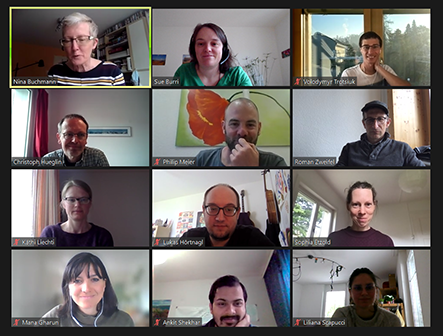
As every year in spring, everyone working for ICOS-CH at the Davos station (from ETH Zurich, WSL and Empa) met at the traditional ICOS@Davos meeting. The aim of this meeting is to share information, to address any questions, to plan the upcoming field season and to exchange ongoing scientific efforts and results. Usually, this was held as an informal meeting where eveybody also enjoyed meeting each other for lunch or a drink afterwards. As for many other events, this social part had to be skipped this year and the meeting was held entirely virtually. Nevertheless, everybody was happy about the outcome of the meeting, impressed by all the publications in the pipeline, and we are looking forward to a hopefully successful and nice field season. Let's hope that we can meet in person soon! (12 April 2021)
A warm welcome to Liliana Scapucci and Moritz Bruggisser who are starting in our group today. Liliana will do her doctoral thesis within the COCO project, and Moritz is our new postdoc in the EcoDrive project. We are looking forward to working with you and have a good start! (1 April 2021)
March
The annual conference of the external pageSwiss Society for Agricultural Economics and Rural Sociology (SGAcall_made) took place online this time. One of the keynotes was delivered by Nina Buchmann, addressing the topic "external pageLandwirtschaft: Treiberin und Getriebene vom Klimawandel. Was tun?call_made". Also Sergei Schaub presented one of his latest studies. (18 March 2021)
The ecological restoration and rehabilitation of urban greenspace can benefit people and nature: based on two new papers (external pageLampinen et al. 2021call_made; external pageKlaus & Kiehl 2021call_made), Valentin Klaus presented his work on urban ecology in the Plant Ecology Seminar at the University of Bern. Thanks for lively discussions! (10 March 2021)
"Schwitzen Wiesen und Wälder so wie wir?" (Do meadows and forests sweat like us?), was the topic of a talk at the external pageKinder-Universität Zürichcall_made given by Nina Buchmann. Once postponed in 2020, it now took place in zoom: a 30 min talk followed by about 20 min discussion with about 80 children of grades 3 to 6 (primary school). Great questions, addressing different plant types, ecosystems, and even poop..... An interview by a Kinderreporter followed. Quite an experience, enjoyable and eye-opening! Thanks for the invitation! Find the recording external pageherecall_made. (19 March 2021)

How do you go about introducing earthworms to a school class? The young researchers participating in this year's LERNfeld environmental education project received tips on this and other aspects of teaching during the introductory course held on 8 March. LERNfeld has been offered for six years in the spring semester as outreach education in the field of agriculture in the context of biodiversity and climate change by Sabina Keller with external partners from external pageGLOBEcall_made and external pagePH FHNWcall_made. (8 March 2021)
Spring is coming and the cows are hungry for fresh grass. Time to start setting up grazing exclosure cages on the pastures for the ServiceGrass project. Thanks to strong helpers, the first cages are standing and look more or less robust. Hopefully they will withstand curious cows! (5 March 2021)
The project DiversGrass makes the start to the series «Forschung kompakt» with examples of research from the IAS in the Swiss agricultural newspaper die grüne. The short article summarizes the main findings of DiversGrass and Nina Buchmann and Robert Finger comment on the interdisciplinary research of our institute. The article is illustrated with a nice photo taken by Valentin Klaus. Read the full contribution external pageherecall_made (in German only). (4 March 2021)
February
Philip Meier, Ankit Shekhar and Mana Gharun had to do some maintenance at our field site in Davos for ICOS-CH and the FEVER project. The three were awarded with nice winter weather and a beatiful scenery. Have a look at how spectacular field work in winter can be! (26 February 2021)
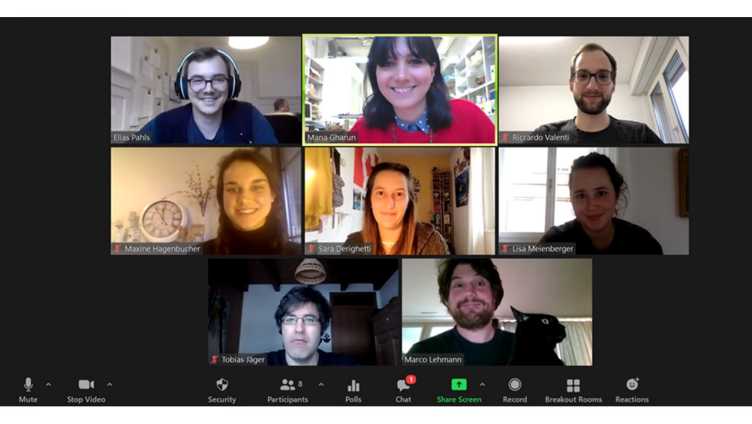
The next semester is just a few weeks away but we only just now finished the last course of the autumn semester 2020. Mana Gharun and external pageMarco Lehmanncall_made taught the Advanced Lab Module. Due to Covid-19, they decided to move the lab course online. Quite an undertaking - but perfect preparation and the use of several cameras made it possible. Of course, the students missed the hands-on lab work, but they still enjoyed the course and all the different inputs and exercises Mana and Marco provided. (4 February 2021)
January
Our Annual Academic Achievements report 2020 has been submitted. Here some impressive numbers:
- 672 students taught in 2020,
- 516 grades given in 2020,
- 6 Bachelor's and Master's students finished in 2020,
- 13 active doctoral students (by the end of the year),
- 2 doctoral students finished in 2020,
- a large number of publications ... 69 !!! This is all time record!
- Out of the 62 journal articles, 42 are open access, thus 68%. This is more than double of what we had last year!!
- About one third, 20 papers have been written in large consortia.
Thanks a lot: great team, great fun, great success. (26 January 2021)
As each year ... actually no. This year, our IsoEcology course took a very different road. We started onsite on Friday, but gradually moved the course online during the following week. Most of the experiments were done on Monday afternoon, adhering to our "Schutzkonzept" (safety concept), only a small number of students came in, coached by members of our and neighboring groups, some worked with existing data. The result? Great talks on Friday afternoon. So, yes, "we can do it (online)" (free after Bob, the Builder). (15 to 22 January 2021)
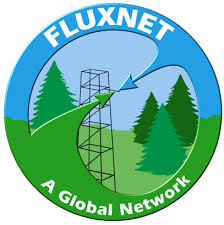
Open access data, an issue we pursue in our group since long. Last year, our flux data from the Swiss FluxNet sites were downloaded 3213 times (as part of the external pageFluxnet2015call_made release), compared to 2176, 1907, 1853 and 1062 times in 2019, 2018, 2017 and 2016, respectively. Thus, we see a strong increase in download numbers. This translates to an impressive 191 downloads per month in 2020. Since the full Fluxnet2015 dataset has been made available, the Swiss FluxNet data have been downloaded 10211 times in total!!
Also considering the Panama data, our flux data have been downloaded even 12926 times!! In addition, the brand-new CH4 and N2O flux data set has already been downloaded 183 times in 2020. (14 January 2021)

The specialist group Urban Ecology of the external pageEcological Society of Germany, Austria and Switzerland (GfÖ)call_made got new speakers and will soon be filled with a lot of new activities. Valentin Klaus has taken over the lead of the specialist group togehter with external pageMonika Egerercall_made (TU München), external pageLeonie Fischercall_made (University of Stuttgart), and external pageSonja Knappcall_made (UFZ Halle). (6 January 2021)
A warm welcome to Bruno Pfister who will support our team in the field and in the workshop for the next two years! (4 January 2021)
Happy New Year! The Grassland Sciences group wishes you all the best for the year ahead! Stay healthy! We look forward to continuing our current research projects, starting new projects and campaigns, working with engaged students, and interacting with an interested public. If you are interested what we did last year, check here. And most of all, we hope to meet many of you in person this year. (1 January 2021)

